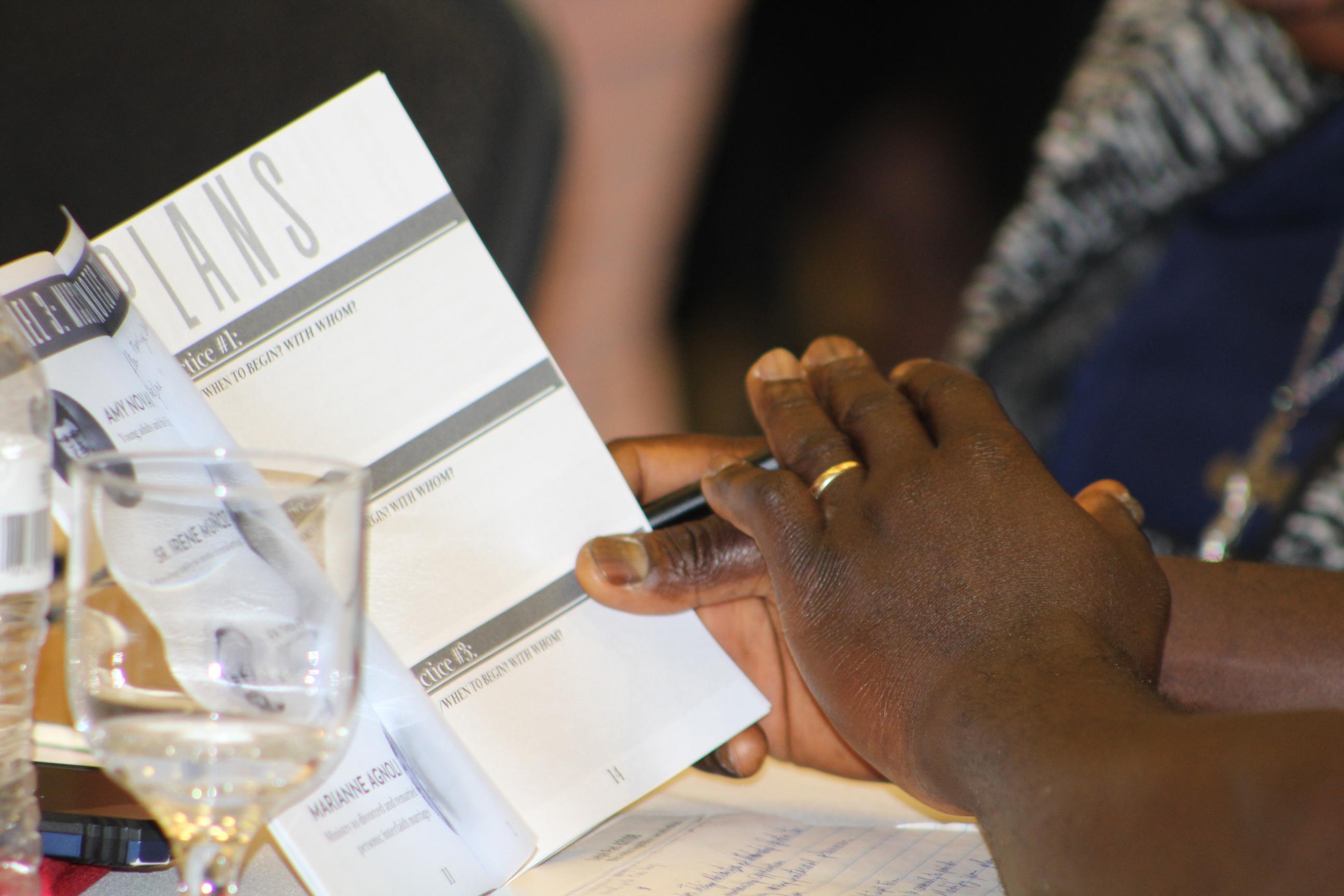"HOLY SPIRIT, ACTIVATE!"
A Recap from the June 2023 Synodal Summit


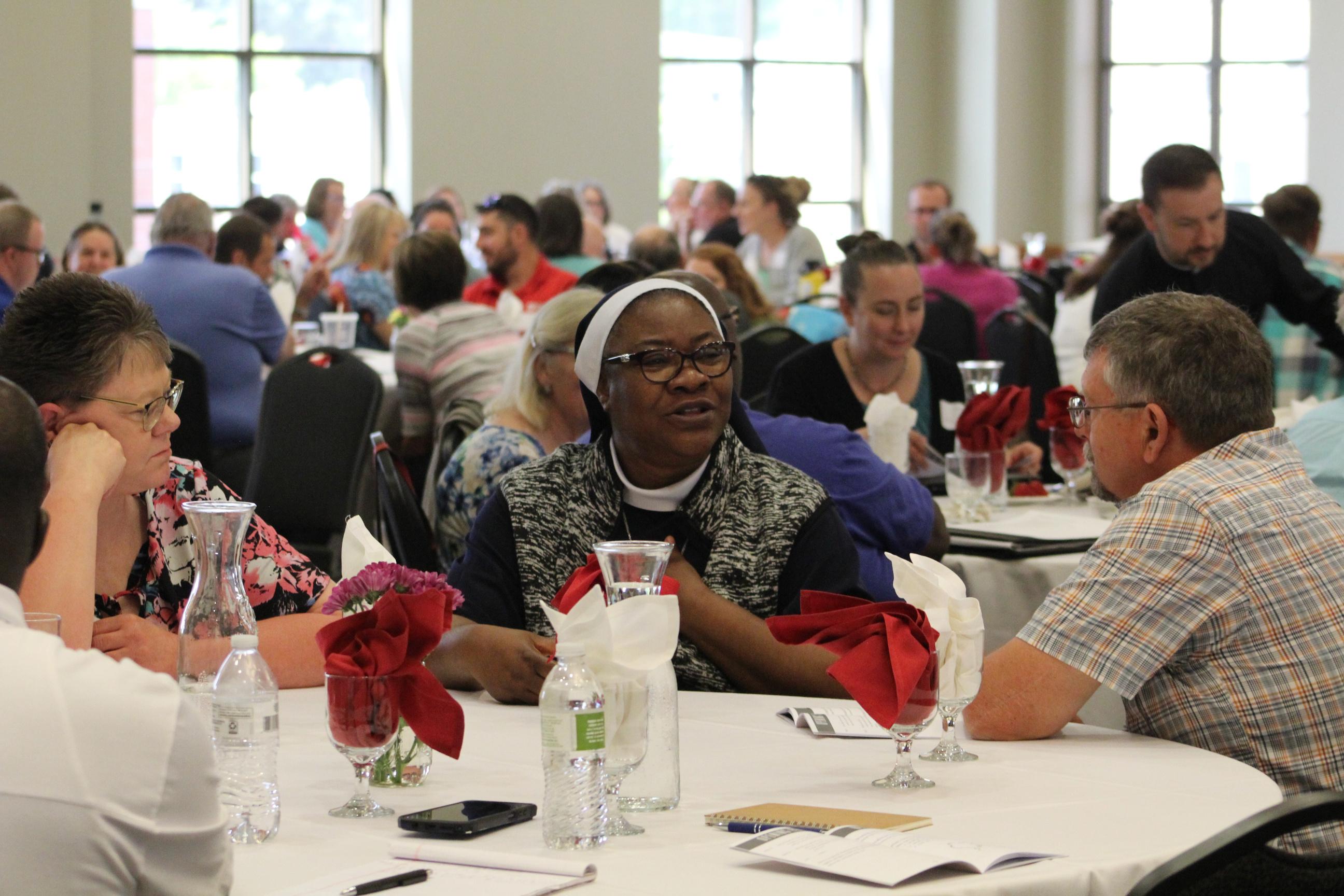
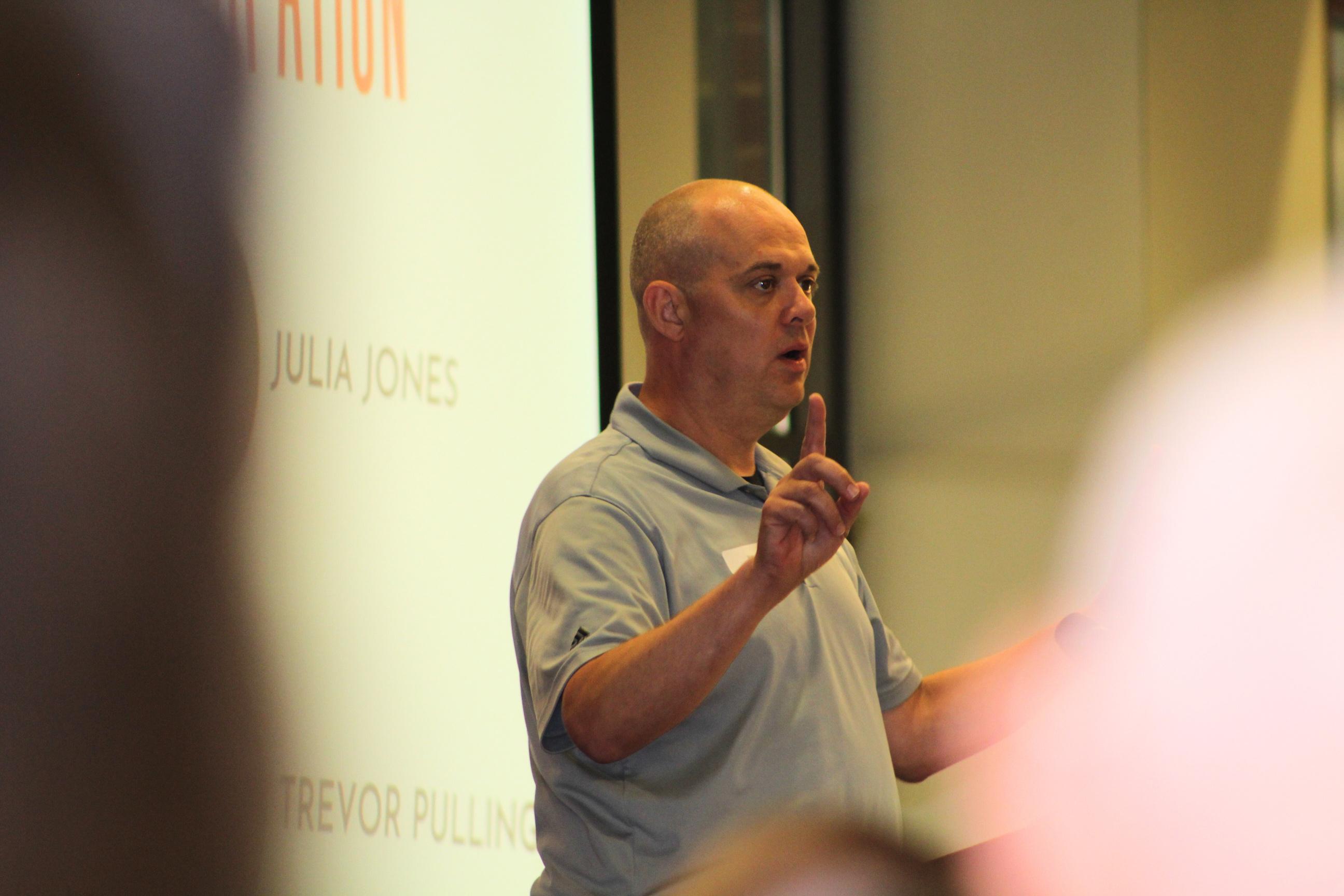
 Deacon Ryan Burchett
Deacon Ryan Burchett





 Deacon Ryan Burchett
Deacon Ryan Burchett
Letter from Bishop Zinkula - p.3
Adsumus prayer - p.4
Our 2023 panelists - p.5
Summit coverage from The Catholic Messenger - p.6
Synodal Summit energizes participants: Kickstarting a yearlong focus on welcoming and belonging
Introductory video - p.7
What can happen when we listen?
Session #1: Communion - p.16
Get into the fielding position, bring people together
Session #2: Participation - p.22
Increase participation by meeting people where they're at
Session #3: Mission - p.28
The mission: Panelists share what it means to better witness to the Gospel
The role of welcoming in a faith journey - p.36
Belonging precedes believing
Welcoming and belonging website - p.38
Inspiration for tent imagery - p. 39
Prayer for Welcoming and Belonging - p.40
We're here to support you - p.41
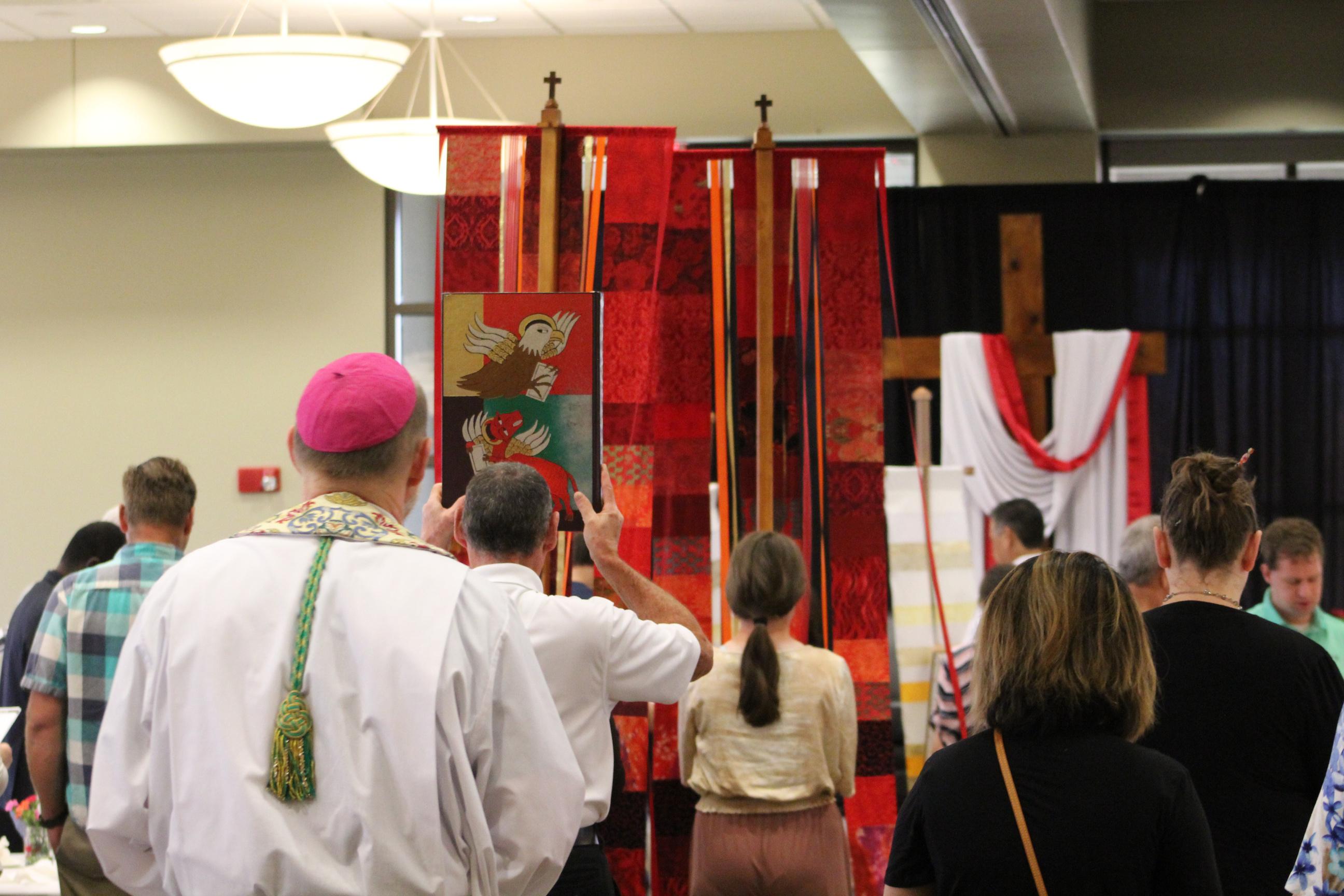
It was wonderful to be with you at the Synodal Summit on June 17th. The energy in the room was uplifting Your presence was a gift; you have a clear desire to integrate welcoming and belonging into our parish and school communities. I am looking forward to seeing the fruit that this gathering will bear and where the Spirit will lead us during the next year. My remarks here reflect my comments at the opening of the Summit.
Eleven themes emerged from over 470 listening sessions that took place in our diocese. Some people lovingly challenged: “What are we going to do with what we’ve heard?” This is what we are doing Our next step was to ask parish councils and school boards to prioritize the 11 themes. Three themes rose to the top, which we will tackle one by one over the next three years:
Welcoming and Belonging (2023-2024)
Youth and Family Engagement (2024-2025)
Church Teaching and Tradition (2025-2026)
To move the needle, we will need greater collaboration among the clergy and the laity. Through our common baptism, we are called to co-responsibility for the Church’s mission to spread the Good News of Jesus in our daily lives.
The present context in which we spread this Good News is one of a sharp rise in loneliness, isolation, hopelessness, anxiety and depression, all of which were exacerbated by the COVID-19 pandemic A recent report from the US Surgeon General confirms this experience among Americans of all ages. The fact of loneliness and the need to create spaces of belonging is present in the diocesan, regional, national, continental, and even global Synod reports.
At the Synodal Summit, three panels shared their thoughts on how we could do a better job of welcoming people to our parishes and schools, and thereby enabling them to feel a greater sense of belonging As I shared at the Summit, I would like to leave you with some “fatherly advice”:
Consider putting together a small team to work with you on your efforts. Collaborate with the pastor, principal, parish council and school board. Be reasonable about what you decide to take on. If you try to do too much, then none of it may be done well.
Seek the support of the chancery when you are stuck or have questions
Finally, this is going to be a messy process. We expect it to be messy because life is messy. I don’t know exactly where this year will go; we need to leave room for the Spirit to lead us.
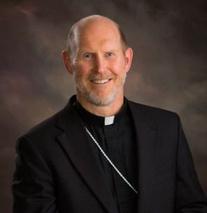
We stand before You, Holy Spirit, as we gather together in Your name.
With You alone to guide us, make Yourself at home in our hearts; Teach us the way we must go and how we are to pursue it.
We are weak and sinful; do not let us promote disorder. Do not let ignorance lead us down the wrong path nor partiality influence our actions.
Let us find in You our unity so that we may journey together to eternal life and not stray from the way of truth and what is right.
All this we ask of You, who are at work in every place and time, in the communion of the Father and the Son, forever and ever. Amen.













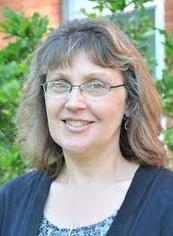
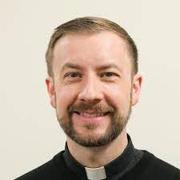
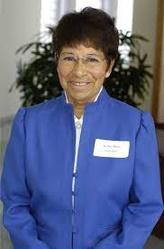
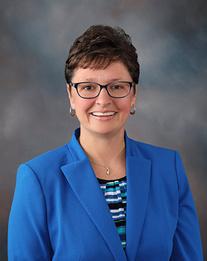
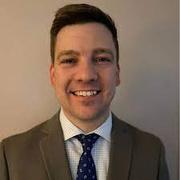
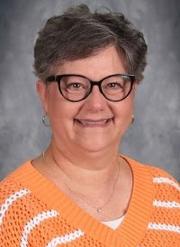

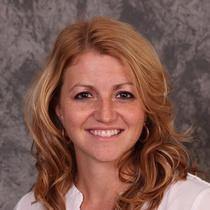
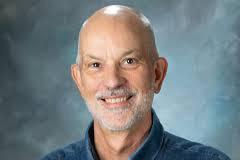
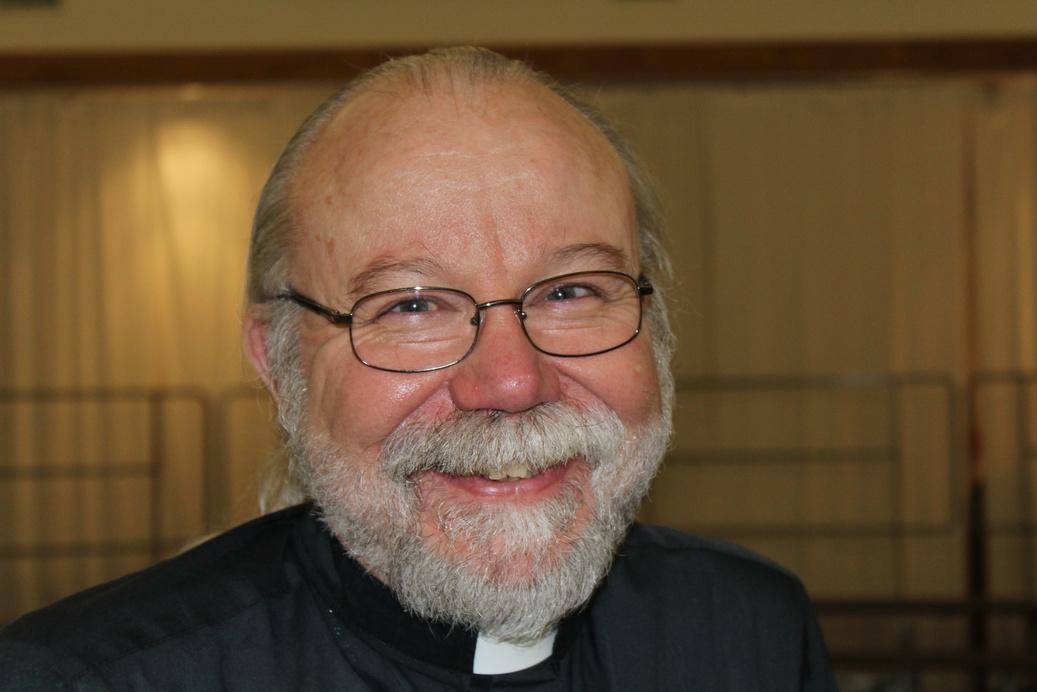
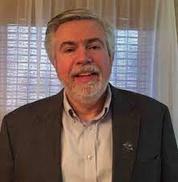
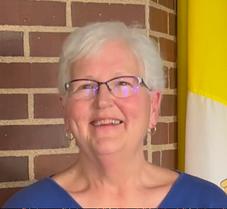
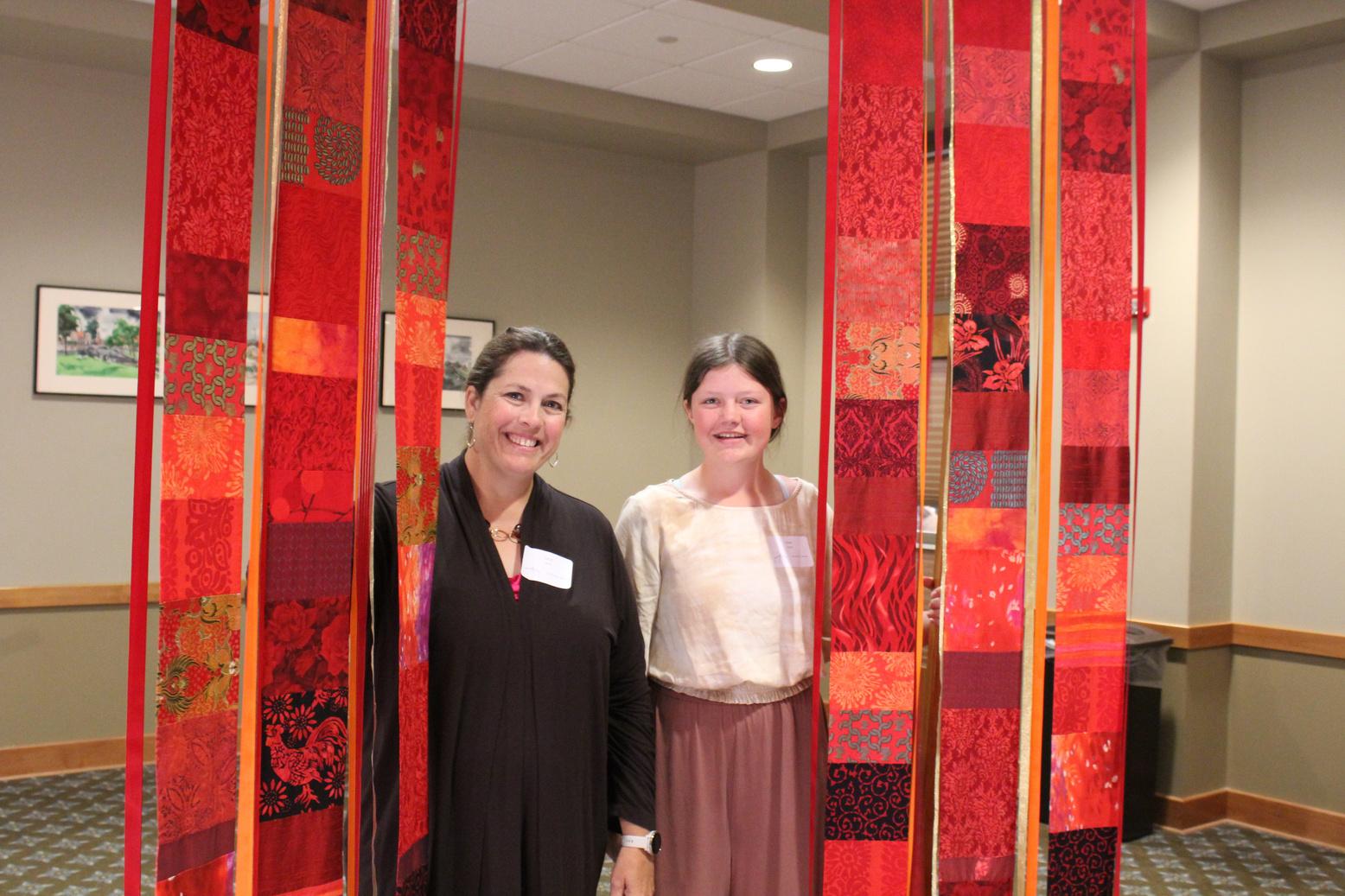
Catholics carrying banners, the Book of the Gospels and an icon of the most Holy Trinity led a procession into the Rogalski Center of St. Ambrose University for the Diocese of Davenport’s Synodal Summit on June 17
Enthroning the Book of the Gospels served as a reminder for the gathering of severalhundred people from parishes and schools throughout the diocese that “Christ is the true ‘presider’ of any council or synod. … We gather under Christ’s authority to discern: to listen to what the Word has to say to us; and then we are sent to follow
what the Word asks of us” (Synodal Summit booklet).
In his welcoming address, Bishop Thomas Zinkula summarized the universal Synod of Bishops, which Pope Francis commissioned in 2021 and which took the unusual step of seeking input from the laity about the future of the Catholic Church. The Synod began with listening sessions worldwide that addressed three dimensions communion, participation and mission and resulted in national, continental and universal reports that the Synod of Bishops will address in October of this year and again next year.
The synodal process, which means journeying together as the people of God, inspired the Davenport Diocese to “continue on with this. Welcoming and belonging is a foundation we can build on,” Bishop Zinkula told the gathering. To move the needle forward in parishes and schools, “there needs to be a greater collaboration among the clergy and laity … to spread the Good News of Jesus Christ together.”
Bishop Zinkula said summit organizers planned three panels “to share thoughts and ideas” of how we can do a better job of welcoming people to our parishes and schools, thereby enabling them to feel a better sense of belonging.”
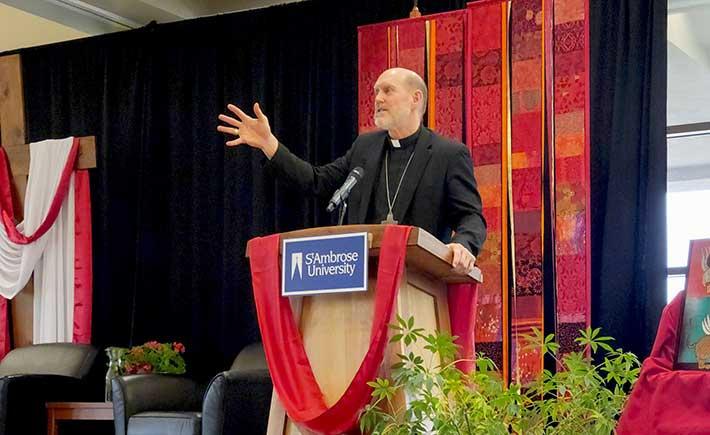
He encouraged th assemble a small t their pastors, pari school principals a endeavor “Be rea decide to take on, diocese is plannin of welcoming and parishes and schoo own, he added. Th be messy, he advi know where this is Francis doesn’t kn go. We need to lea lead us.”
Following the bish conversed at roun
experiences of welcoming and belonging or lack thereof A few babies babbled in the background and one little girl playfully ran from her mother. The presence of these few young children acknowledged the reality of participants needing to juggle busy lives with a daylong summit exploring what it means to be a welcoming Church in which the faithful have a sense of belonging.
Parish, school and diocesan leaders shared their insights during panel discussions on communion, participation and mission, followed by Q&A opportunities and table conversations. The Messenger will provide separate articles on each panel in the coming weeks. Here are a few highlights from the panels:
“The Church is not a building. It’s about people. We are the Church,” said panelist Colleen Burke of the St Patrick cluster of five parishes in Clinton County. She spoke about the cluster’s efforts to build relationships among parishioners spread as far as 50 miles apart.
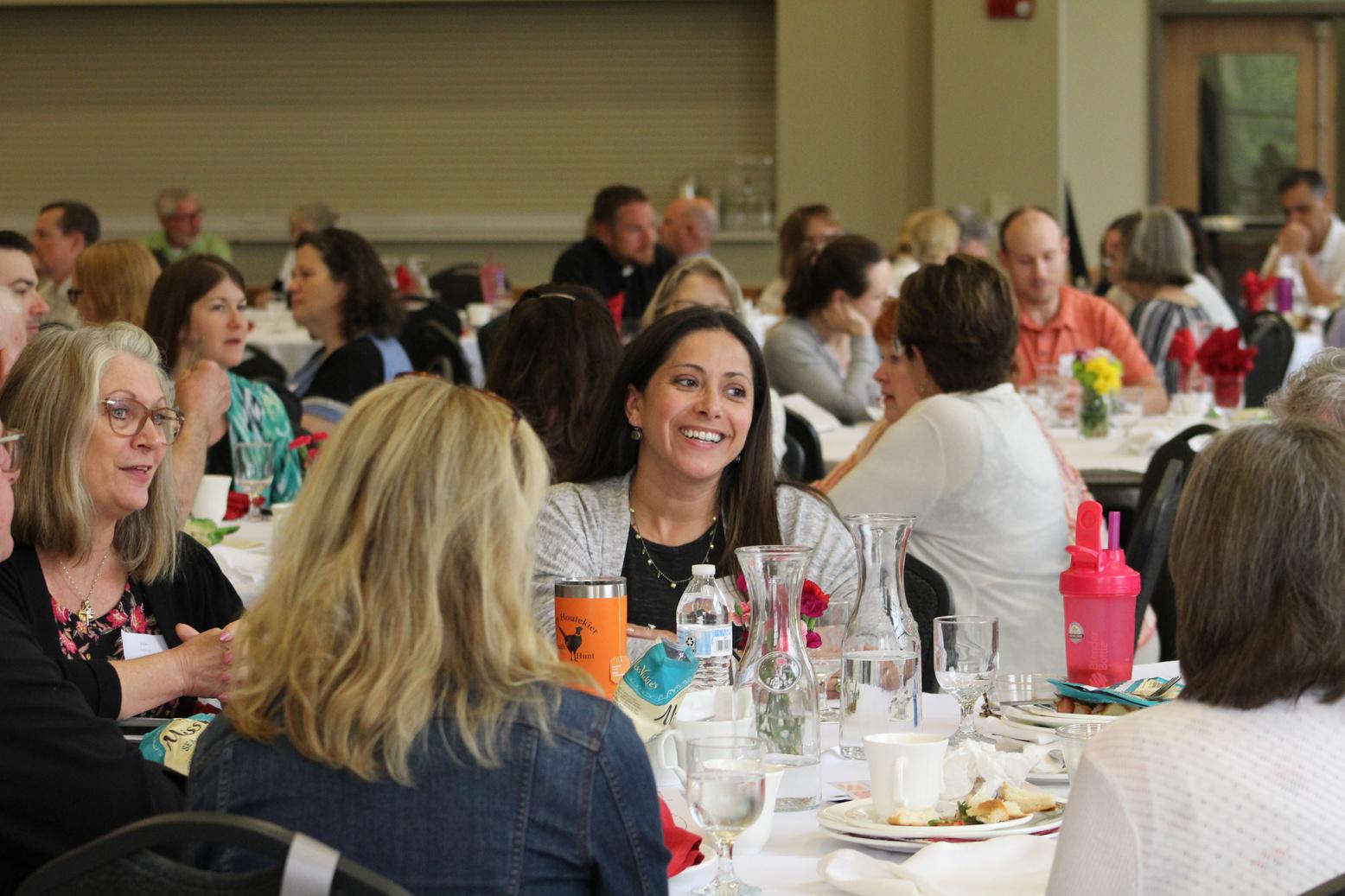
John Cooper crouched into a baseball fielder’s position. “We need to get into position to play and to welcome others,” said Cooper, pastoral associate and business manager of St. Anthony Parish in Davenport He said he borrowed an idea on publicly welcoming newcomers during the
Mass from Sister Irene Munoz, CHM, who retired last year from multicultural ministry in the Ottumwa area
parish practicing perfect liturgical hospitality. These are some matters he asked the representatives to ponder: “How do we ‘see’ one another when we gather for liturgy? For how we ‘see’ will determine how we act.” The Mass “calls us to conversion.” A Church that sees everyone worthy of inclusion and welcomes each guest is welcoming Christ.
“It all starts with listening,” said Dan Ebener, diocesan director of pastoral planning. He advised the representatives to enter conversations humbly, willing to listen to and learn from someone else. “Once you’ve listened to someone, they want to listen to you.”
Speaking about the value of small faith
relationship is essential to bringing someone into a small faith group, added Havercamp, director of evangelization and mission for St. Paul the Apostle Parish in Davenport
Julia Jones, youth minister of St. Ann Parish in Long Grove, reminded the gathering that “youth ministry is the job of every adult in the parish.” That job can be as simple as offering to help the youth minister with transportation to events or bringing treats for youth events or meetings. Empower youth, help them to feel needed in the parish, she said.
Sharon Roling, principal of St. Joseph Catholic School in DeWitt, described how the school community strives to foster an environment that is welcoming and in which students, staff and parents feel like they belong. The school community asks itself, “How do we welcome students every day?” She added, “Smiling is contagious.”
Trevor Pullinger, diocesan director of faith formation and catechesis coordinator, spoke about the domestic Church, the household of faith, and encouraged an intergenerational approach adaptive to the whole family. He said families face many challenges. A sense of warmth is essential to faith formation in the family, which is a driving force in passing on the faith.


St. Ambrose University President Amy Novak spoke in a video message about the university’s commitment to foster a sense of welcoming while also addressing the hurt that students deal with around issues such as divorce, LGBTQ+ and polarization in the Church. “We have to show people they matter before they can feel like they belong.”
Sister Irene Munoz spoke on cultivating unity in multicultural settings and the need
to enlarge the tent (a symbol of the Synod) religiously and culturally. Listen to the stories of people who arrived in the U S to escape violence, poverty and upheaval in their homelands. Learn some simple words of welcome in that person’s native language. “Sometimes our body language speaks louder than words.”
Father Thom Hennen, diocesan vicar general and pastor of Sacred Heart Cathedral in Davenport, spoke about COURAGE, an apostolate helping same-sex attracted Catholic men and women to lead chaste lives. In his COURAGE ministry he has discovered “a lot of people who are and want to be Catholic and who love the Church and their Catholic faith. …When it comes to this particular ministry and so many other things we’re talking about, we should not feel forced into choosing between truth and love. The truth is ultimately loving. The way truth is
expressed is not always loving and that’s what we have to navigate very carefully as a Church ”
Marianne Agnoli, diocesan marriage and family life coordinator, spoke on the topics of ministry to divorced and remarried persons, and ecumenical and interfaith marriages. She advised ministers and pastoral leaders to get educated on these topics and to educate their communities. “There is so much misinformation about what the Church teaches and what the Church allows or doesn’t allow,” she said Regarding couples in mixed marriages, she advised being intentional about programs and activities that nurture welcoming and belonging.
After the talks and lunch, participants sketched out action plans to take home, including both easier first steps and more challenging areas. The Synodal Summit
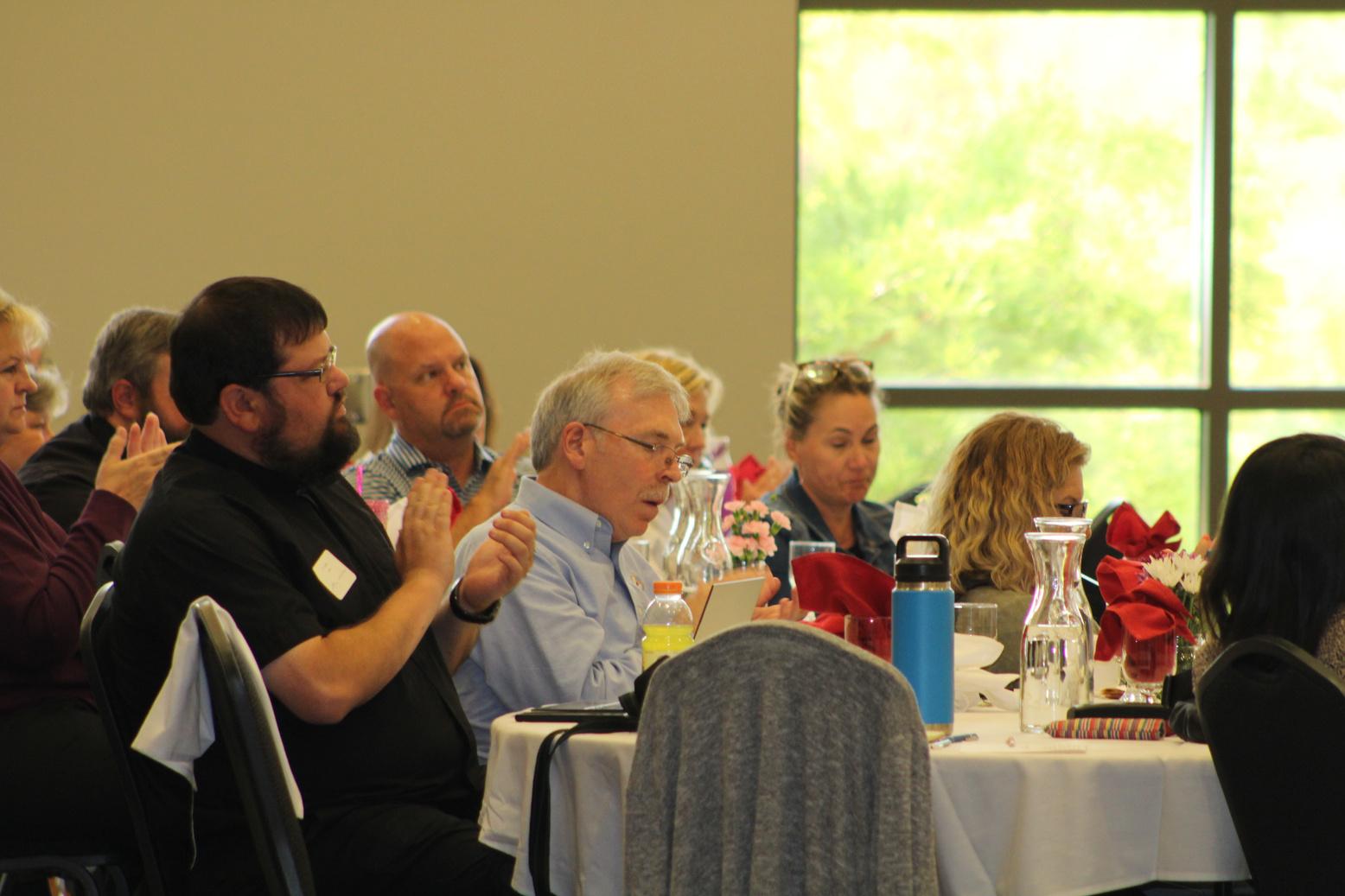
concluded with prayer and a blessing of water and of the gathering, which sang as its closing song “Companions on the Journey.”
“The synodal event exceeded my expectations by educating and providing me with information that will help me help my parish to be more vibrant,” said Marty Ryan of St. Patrick Parish in Melrose. “I am excited to go back and share and engage our young people.”
“These were important topics to make sure new people and people who have shied away from the Church feel welcome in our Church,” said Rick Jacoby of St. Mary Parish in Grinnell. He felt all of the speakers were knowledgeable about the topics on which they spoke.
Clinton County appreciated the big picture approach that the Synodal Summit offered. Sometimes, it is easy to get caught up in the specifics of your parish or parishes’ perspectives. “We’re all in this together. We’ve got to bring everybody back,” she said.
Bishop Zinkula said he was “pleased with and uplifted by the energy of the representatives and others who attended the Synodal Summit, their love of their Catholic faith, and their desire to better welcome people to participate in the life of the Church so they have a greater sense of belonging. Consequently, when I left the summit I had high hopes that this synodal initiative will bear fruit as the representatives develop and put into practice parish and school action plans
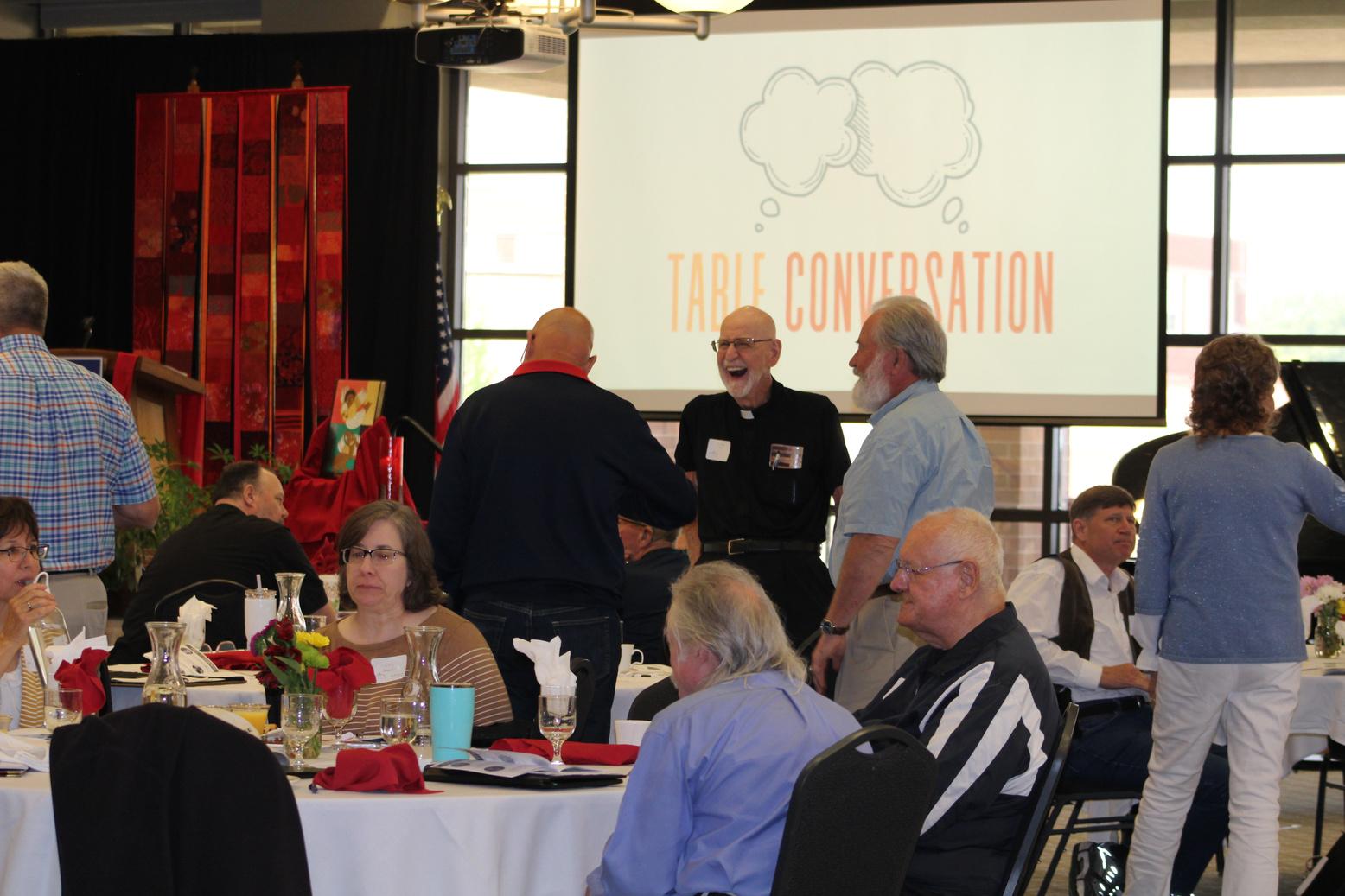
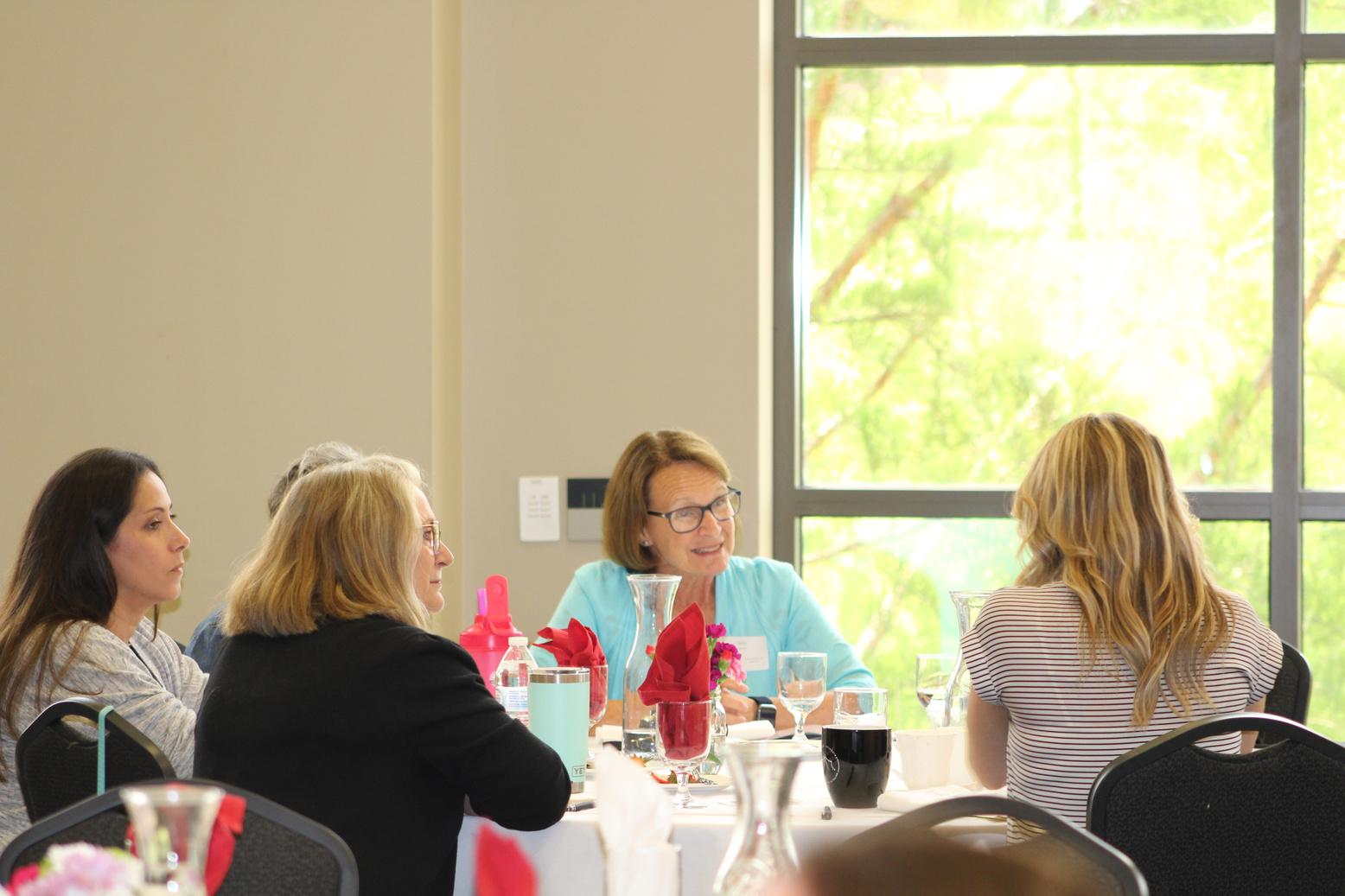
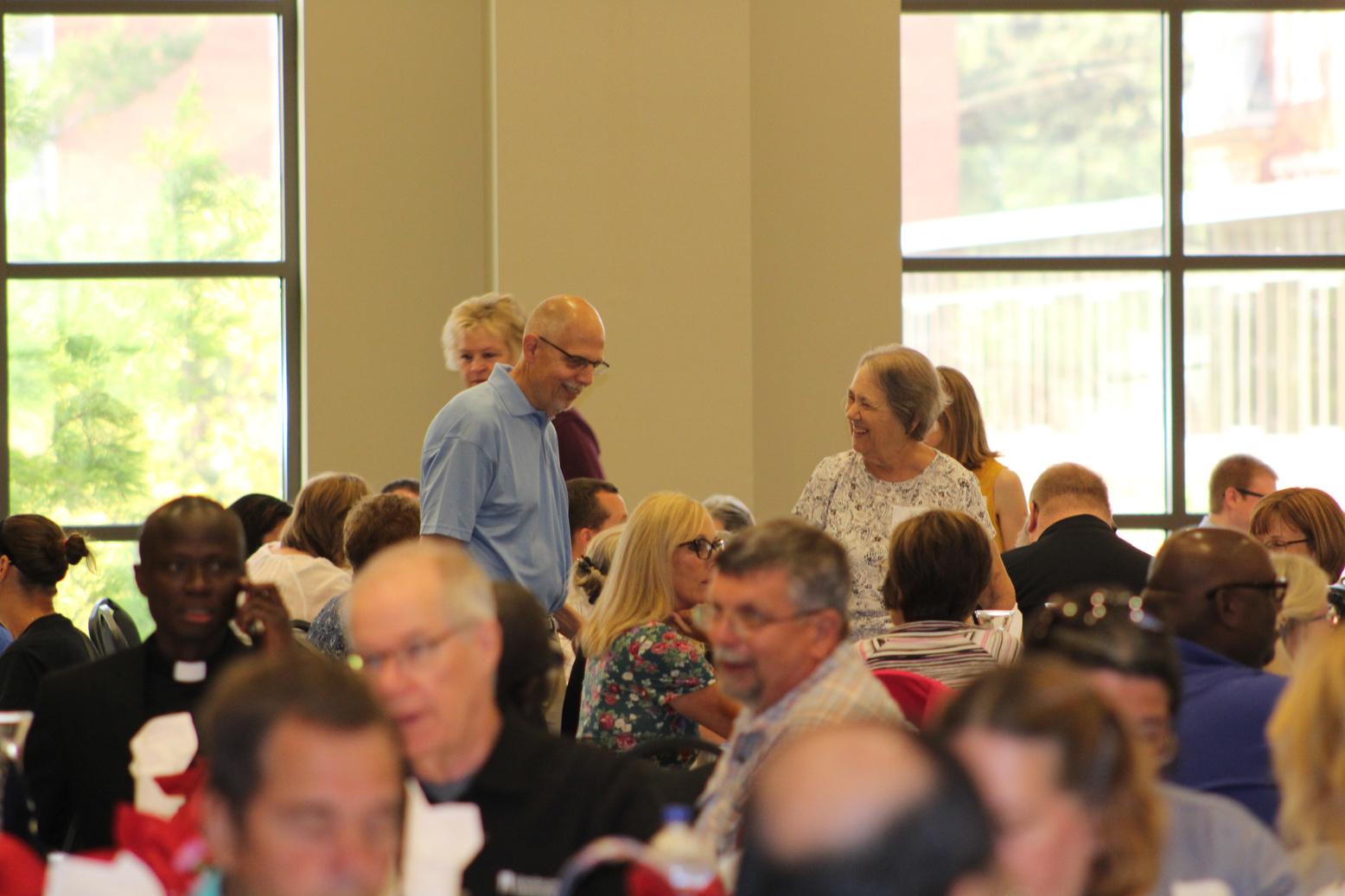
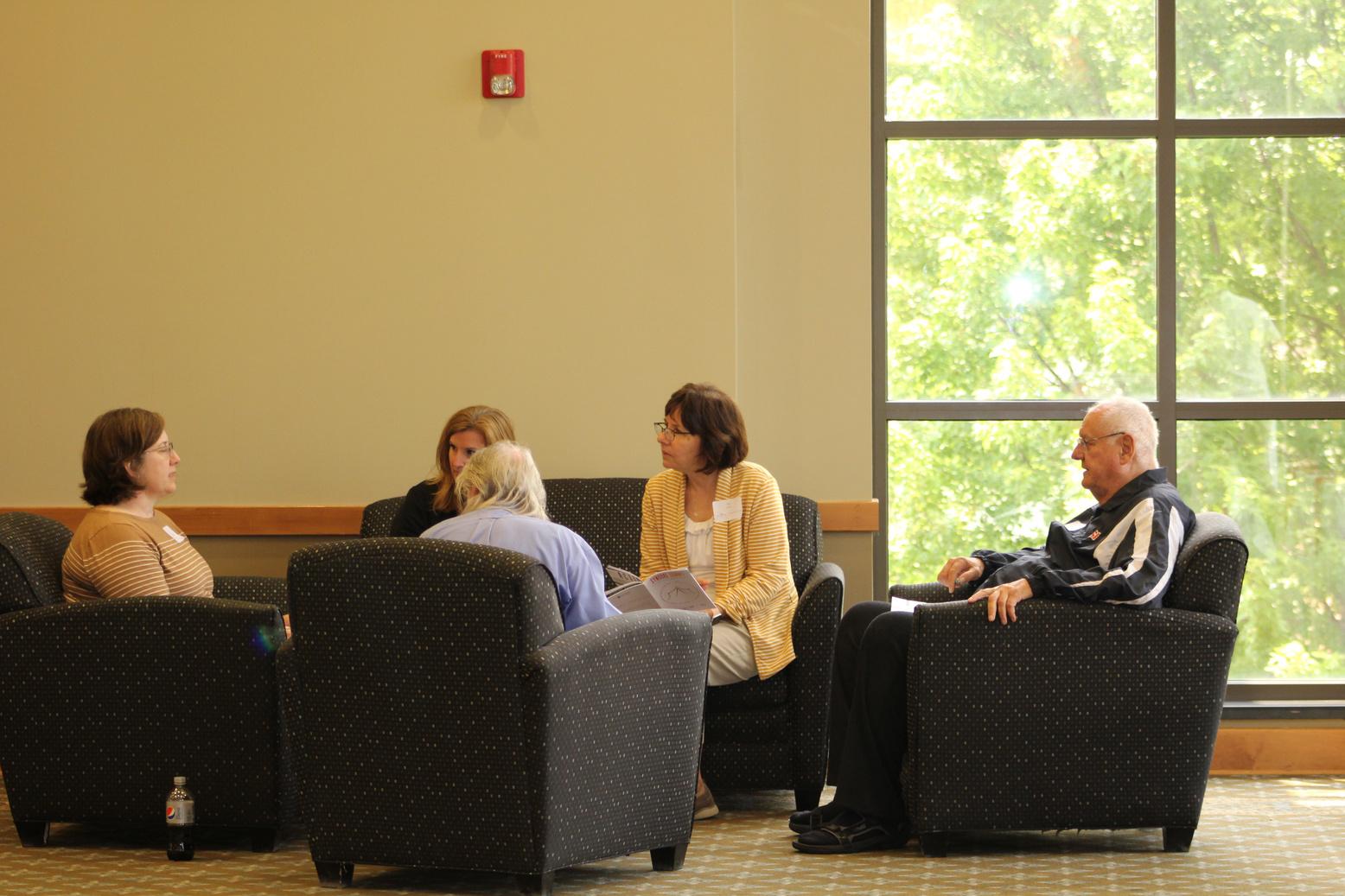
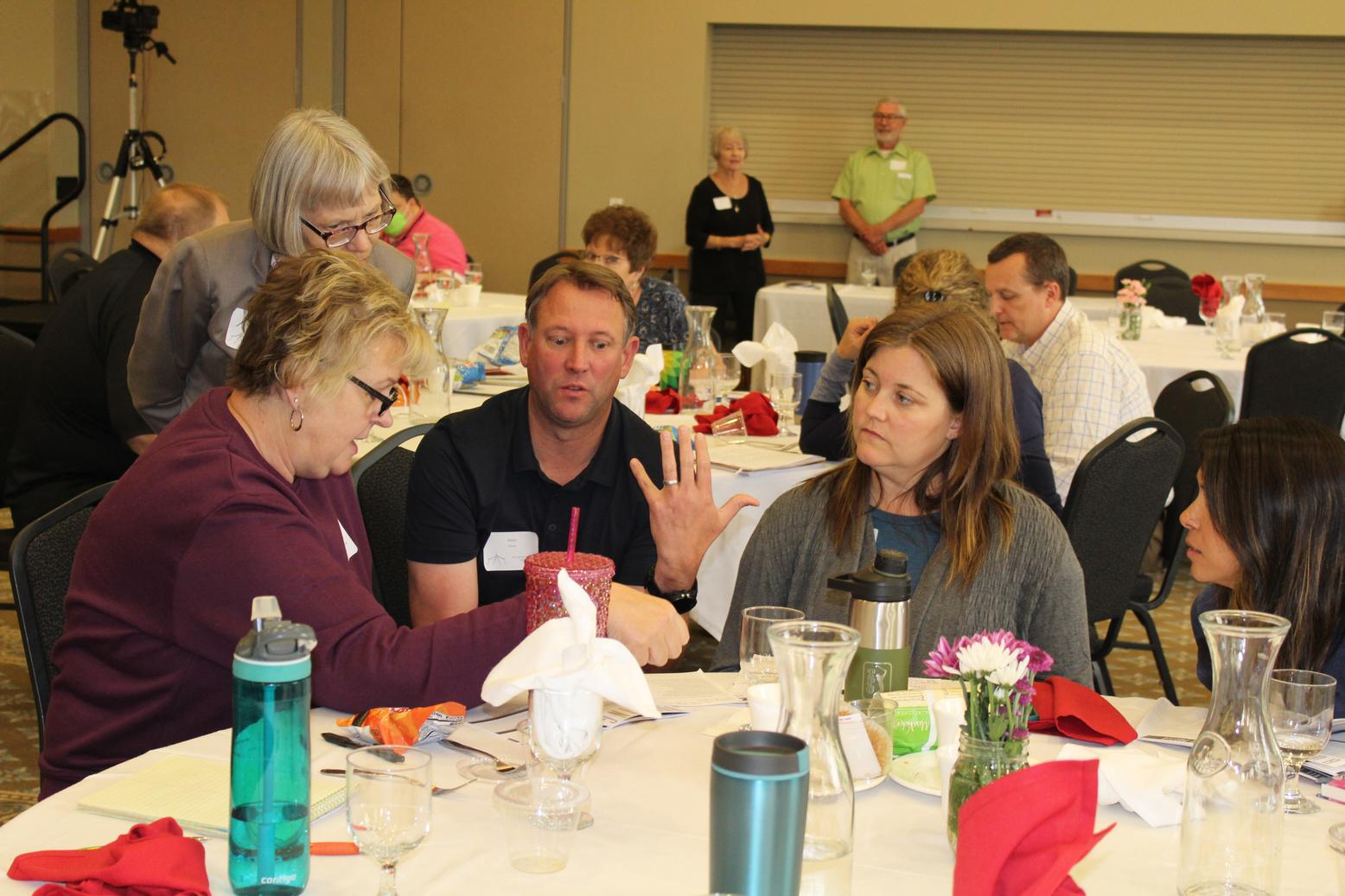
Amy Novak, President of St. Ambrose University, offered a warm welcome to campus, noting how fitting it was that we were at St. Ambrose: "when you delve into the writings of St. Ambrose, I think you realize and recognize his call to each of us to live into vocations that welcome and acknowledge people of all backgrounds.”
Why is welcoming and belonging important?

Tommy from Grinnell, a member of the Diocesan Pastoral Council began by saying, "welcoming and belonging is important because it's our baptismal call." Deacon Angel of Iowa City said welcoming and belonging is important "because Jesus himself came to this world to welcome everyone." He followed this, positing the rhetorical question: who did Jesus sit with? Timothy, who entered the Church this year said "you can't live faith outside of community. Deacon Dane, noted that incorporation into the mystical body is so that we all might be healed
When have you felt belonging or unbelonging in the Church?
When Francesca first moved to Burlington she expected her experience of the parish to be similar to her experience at home in the Philippines. She wondered, however, if she "belonged in that space." The pastor introduced her family to the congregation on their first day at Church and created pathways to get involved in the community.
Leyna from LeClaire spoke to the importance of a mom's group she belongs to as nurturing her faith life. Another contributor, Jeri, from Solon, wasn't raised Catholic, but was drawn to the Church because of the family feel of the Newman
Catholic Student Center community in college.
What do you hope for the future of our Church?
Adam from Solon expressed hope that his children would "come to know Christ through their upbringing here in this community." He also hoped they would realize that "participating in the church actively is a central part to finding meaning in their lives."
Amy was hopeful because young people "hold a great deal of passion and commitment and energy for strengthening our commitments" to community, the environment, to lives of prayer and service, and leadership.
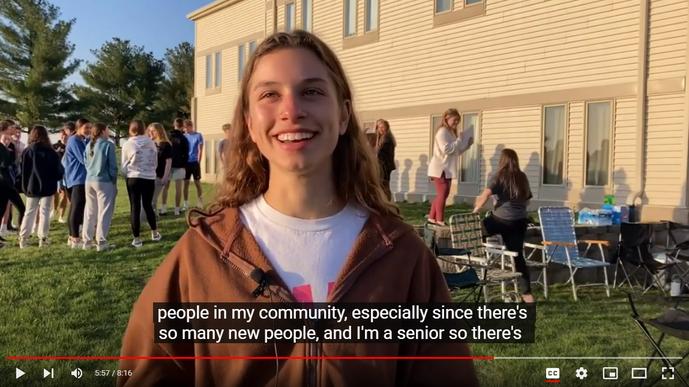
Francesca hoped for the Church to support her young adult children as they explore and try to discover how to best live their faith.
So...why is welcoming and belonging important to you?
Attendees were then invited to find a partner for conversation, reflecting on a personal experience of a time when...
you felt like you belonged in the Church you felt like you were not welcome in the Church you extended welcome to someone
Watch the introductory video here:
www.youtube.com/watch?v=3NkwdzzzWnI
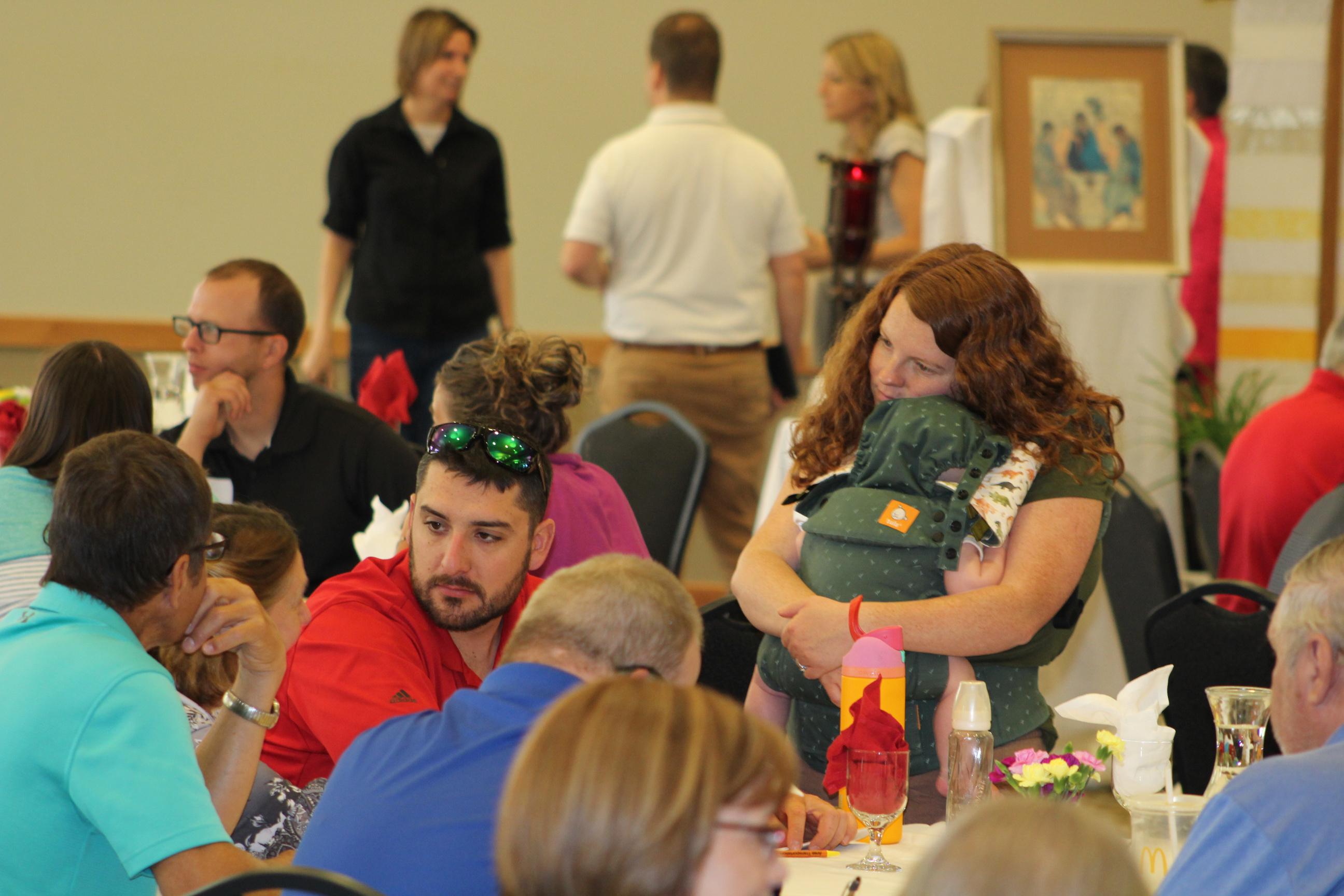
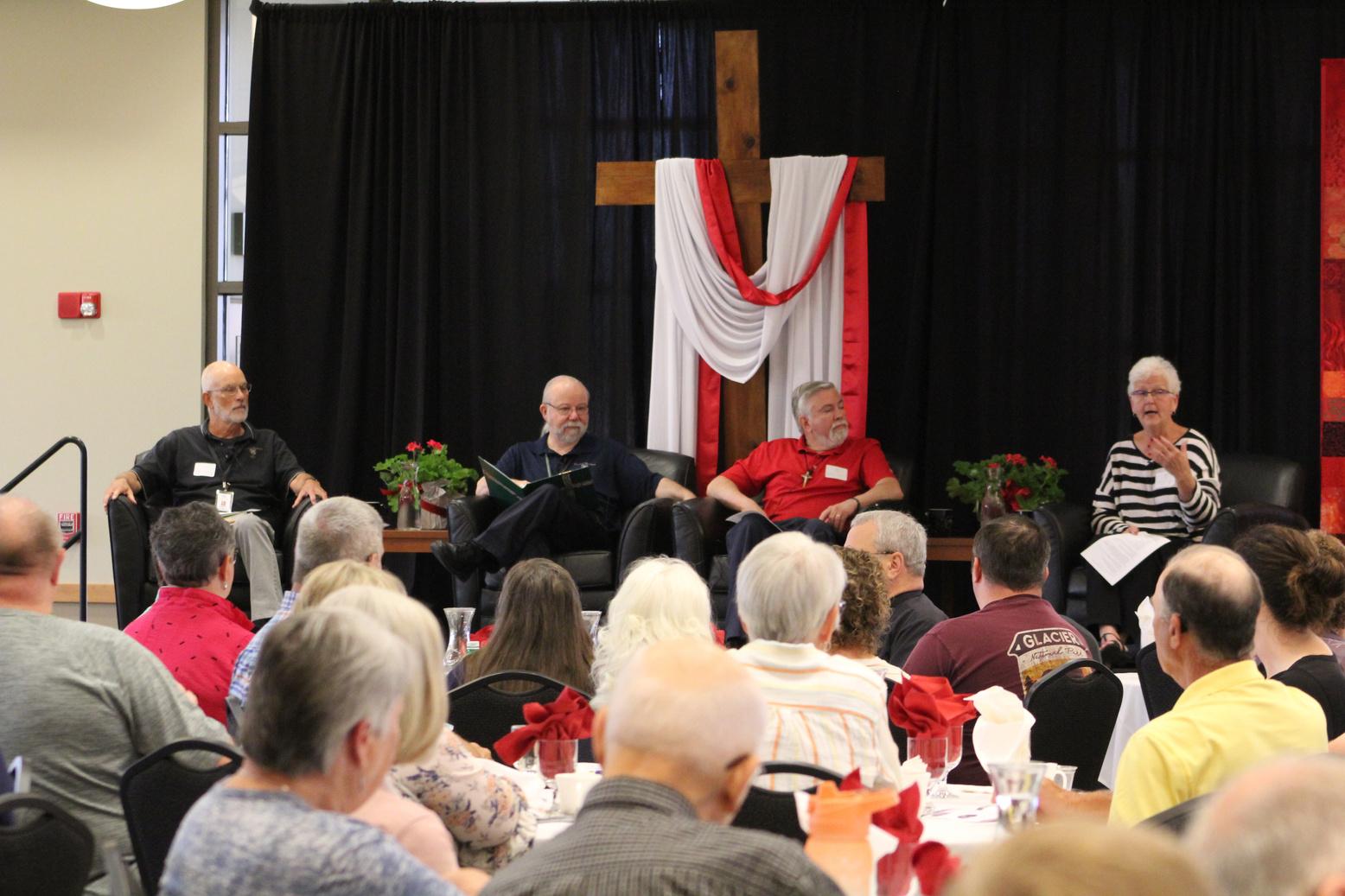
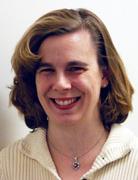
JUNE 29, 2023
To welcome people and to make them feel as if they belong, “we need to get into the fielding position,” said John Cooper, pastoral associate and business manager at St. Anthony Parish-Davenport, as he crouched into position to demonstrate. He shared his insights on welcoming and belonging during the first of three panels held during the diocesan Synodal Summit on June 17 at St. Ambrose University. Each panel addressed a dimension of the Synod of Bishops communion, participation and mission. Cooper, Colleen Burke of the St. Patrick cluster of five parishes in Clinton County, Deacon Frank Agnoli, diocesan director of liturgy, and Dan Ebener, diocesan director of pastoral planning, spoke on communion.
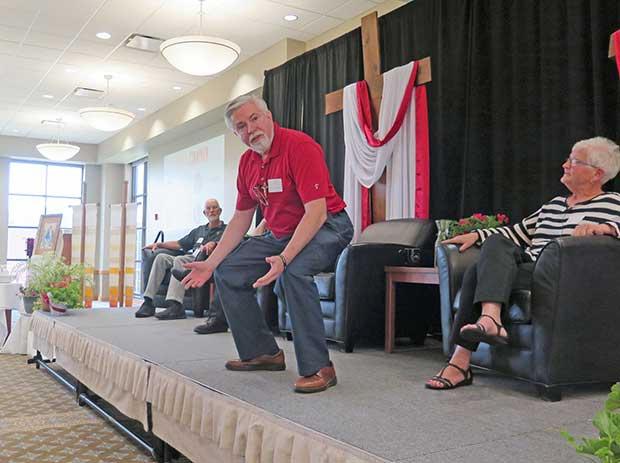
“Welcoming” was an essential ingredient in the successful merger of St. Mary Parish with St. Anthony Parish, Cooper said. Helping others to feel welcome and have a sense of belonging is the most important thing Catholics can do, he said. When St. Anthony Parish asked itself, in a survey, “Would you recommend your parish to others?” Cooper and other parish leaders were surprised to learn that some people did not feel welcome
That was a Kairos Moment. We needed to do something about that. Don’t assume someone is welcoming a person (who looks unfamiliar at a Mass).”
Cooper picked up some good welcoming tips from Sister Irene Munoz, CHM, who retired last year from multicultural ministry in the Ottumwa area. Now, at the end of every Mass at St. Anthony, visitors are asked to stand and be recognized. People are asked whether they are interested in becoming Catholic or are looking for a parish home. Parish representatives are 17
present to meet personally with newcomers and inquirers.
Inspired by the Vision 20/20 convocation in 2019, Burke returned to her parish cluster “back on fire.” A new evangelization team formed. “We were a team meant to share the faith.” But then COVID-19 hit. The bulletin became the only way to communicate with parishioners. Burke said the team used the bulletin to share faith through Scripture reflections created by parishioners in the cluster.
As pandemic restrictions were lifted gradually, various retreats have been held at different churches in the cluster to help
parishioners get to know one another. “Church is not a building. It is about people. We are the Church,” she said. “Don’t get discouraged … Try to spread the joy. You just have to turn one or two hearts to God that is powerful ” She uses the phrase “Holy Spirit activate” for inspiration and hope.
Father Dan Dorau, pastor of four parishes in the southern part of the diocese, asked Burke for suggestions on how to integrate families from the various parishes to create a sense of family. There is no exact answer, she said. “Try planning retreats and move them around the cluster. You need to meet (people) where they are.” Be attentive to introducing people At multi-parish gatherings, make sure people are introduced to others outside their home parish.
Another summit participant asked for suggestions on how to organize a multiparish retreat or other event. Burke recommended getting a variety of people involved. Forming a cluster choir for one event was also a success. Search online for ideas “You don’t need to start from scratch Gather and adapt to your needs.”
Enlarge the space in your tent Deacon Agnoli described “the perfect (mythical) parish” of St. Meinrad where
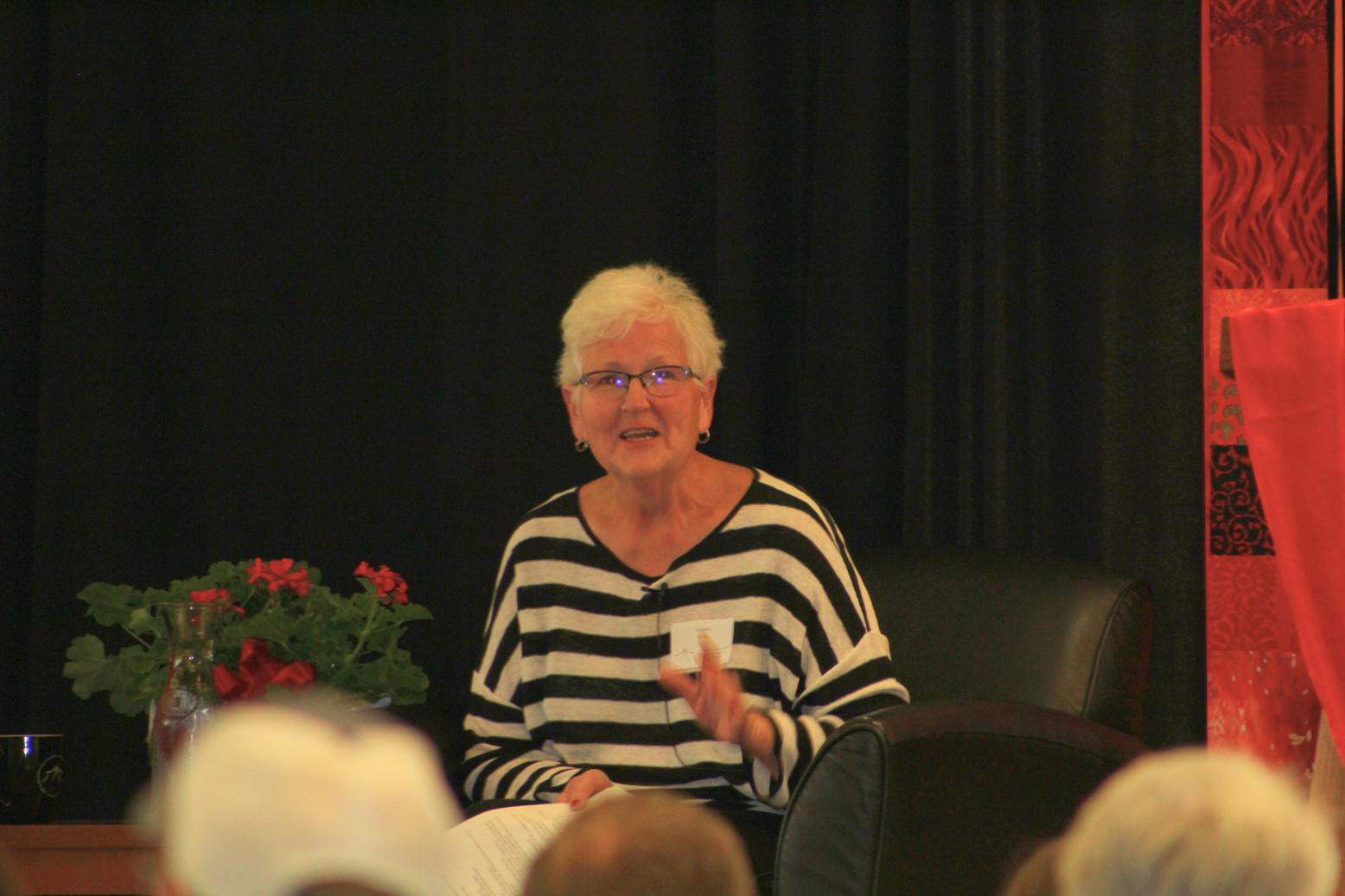
You don't need to start from scratch. Gather and adapt to your needs.
everything from parking to ministries to accompaniment was perfect. Imaging what makes a perfect parish leads to questions parishes can ask themselves: “How do we see each other? How do we act?” he asked. “T th ll t i ”
Ebener, who has worked with parishes across the country, said, “Welcoming does not stop at the front door ” It also includes thoughts and ideas and to build trust and a common mission. How do we do this? “We start by listening.” Listen to the heartbreaking stories. Listen to the inspiring stories. He pointed out that multitasking is not listening. “If you are really listening then they will want to listen to you. Keep your eyes, ears, hearts and minds open.”
“None of us is St. Meinrad’s … our mythical, ideal, imagined parish. This year challenges us to get a little closer to that vision, to see more clearly. What questions do we need to ask? What will we do on this journey? To meet more openly? To seek more intently? To follow more closely? To enlarge the space of our tent?”
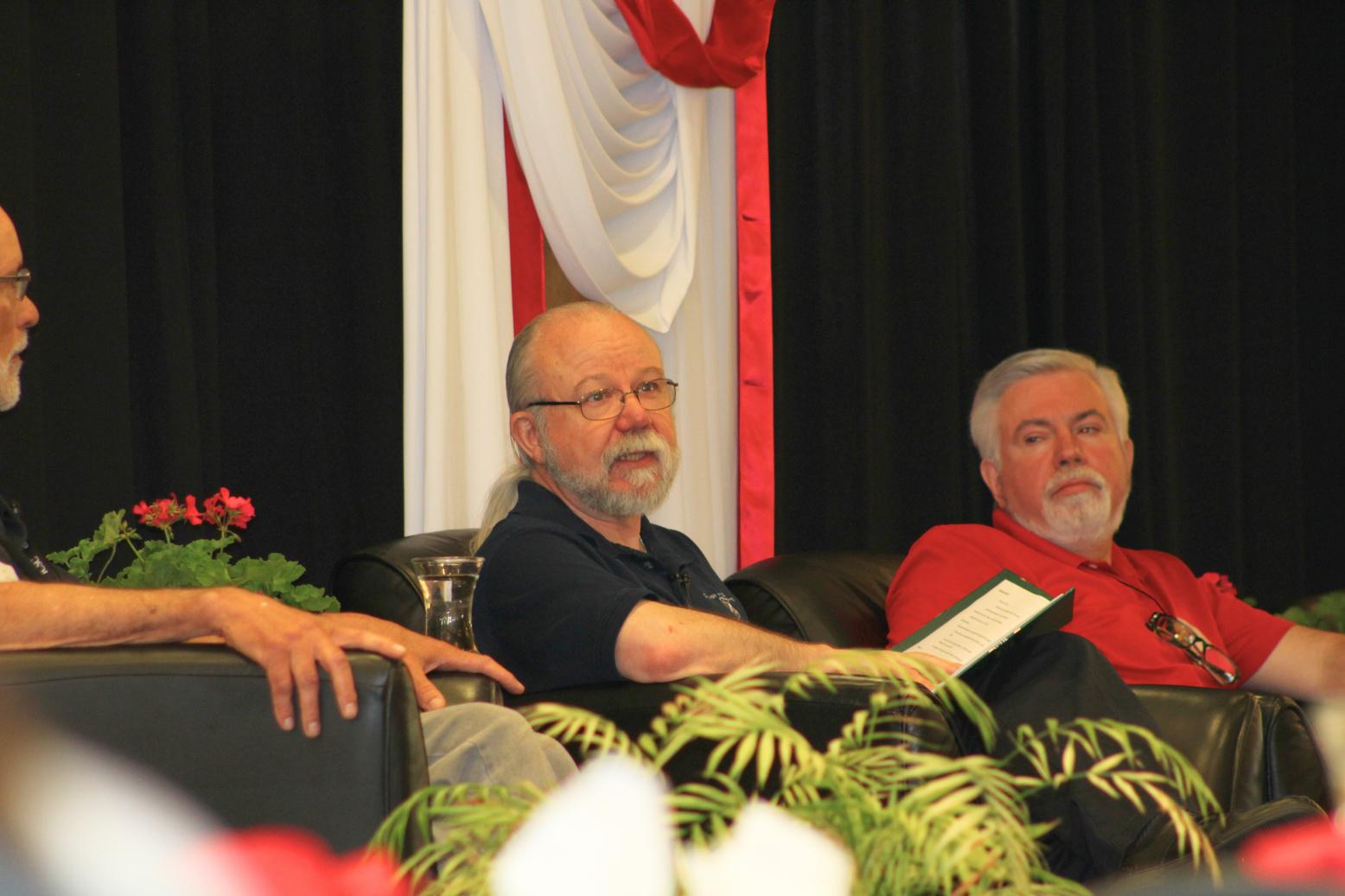
Welcoming does not stop at the front door. It includes thoughts and ideas and to build trust and a common mission. How do we do this? We start by listening.
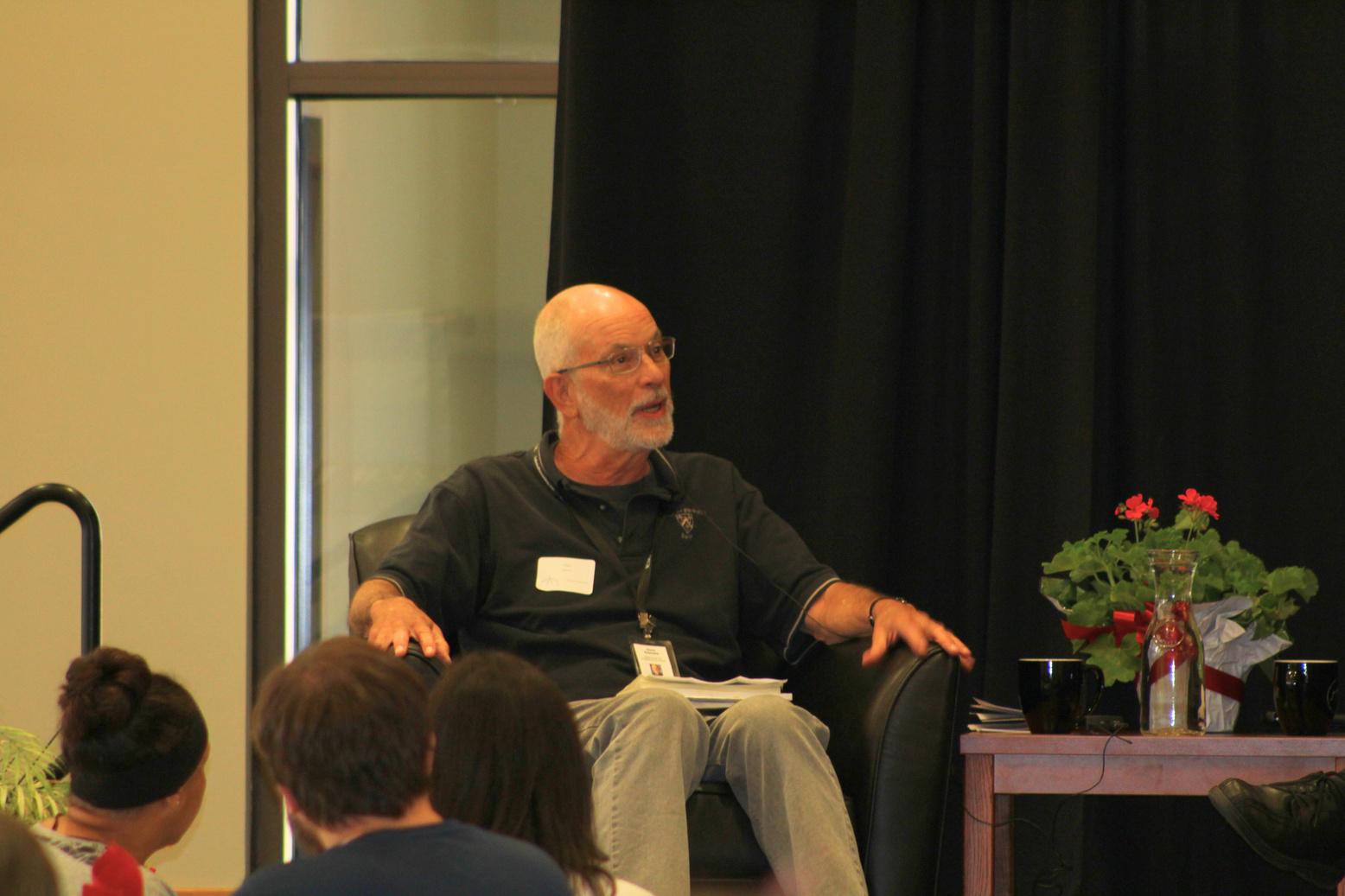
"The communion we share finds its deepest roots in the love and unity of the Trinity. It is Christ who reconciles us to the Father and unites us with each other in the Holy Spirit. Together, we are inspired by listening to the Word of God, through the living Tradition of the Church, and grounded in the sensus fidei that we share. We all have a role to play in discerning and living out God’s call for his people " (From the Vademecum for the Synod on Synodality)
When do I evangelize, sharing the joy of my faith, in daily life?
What new habits can I practice, as John Cooper said, to "get into the position to play, into the position to welcome, into the position help people feel like they belong?"
Do I assume that people I see in my community feel welcome? Or do I assume that people are here because they have a deep need? How do I respond?
Deacon Agnoli named three conversions we are called to. How do I live these out? (1: from accessibility being an afterthought, to being our default; 2) from treating hospitality as the province of a few special ministers, to its being the responsibility of everyone; 3) from placing the emphasis on ordained ministry to returning baptism to center stage )
Begin everything in prayer. As Colleen Burke said of their evangelization team: "we began to build our relationship with God based on his own Word, and we recognized that that is what we are meant to do."
At the end of Mass invite newcomers to stand up to be recognized and thanked for joining Seek these people out after Mass and invite them into the community Seek out 1-on-1 conversations with people inside and outside the Church. Dan Ebener named that welcoming includes welcoming people's thoughts and ideas. Create spaces for this by listening with 1) humility, 2) curiosity, and 3) empathy.
Explore how weddings and funerals can be spaces of welcoming and belonging, especially for those who are not Catholic or have not been practicing
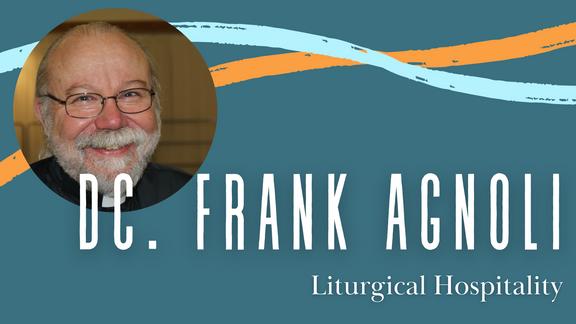
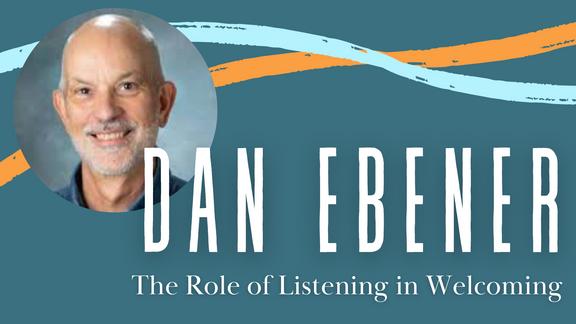

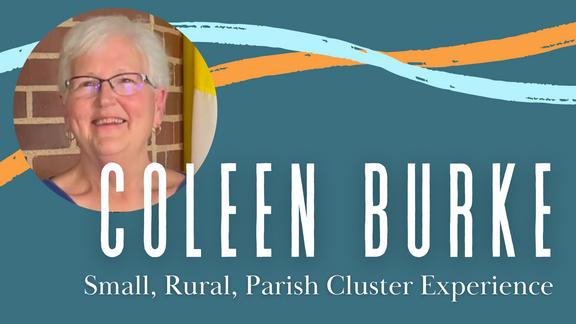
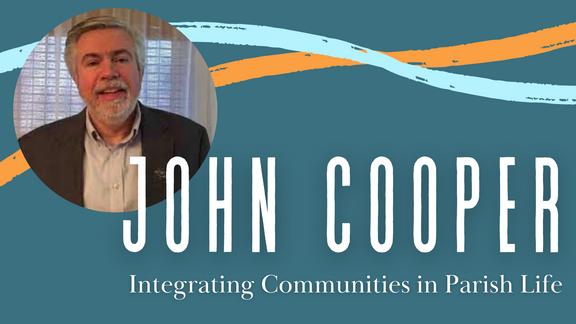
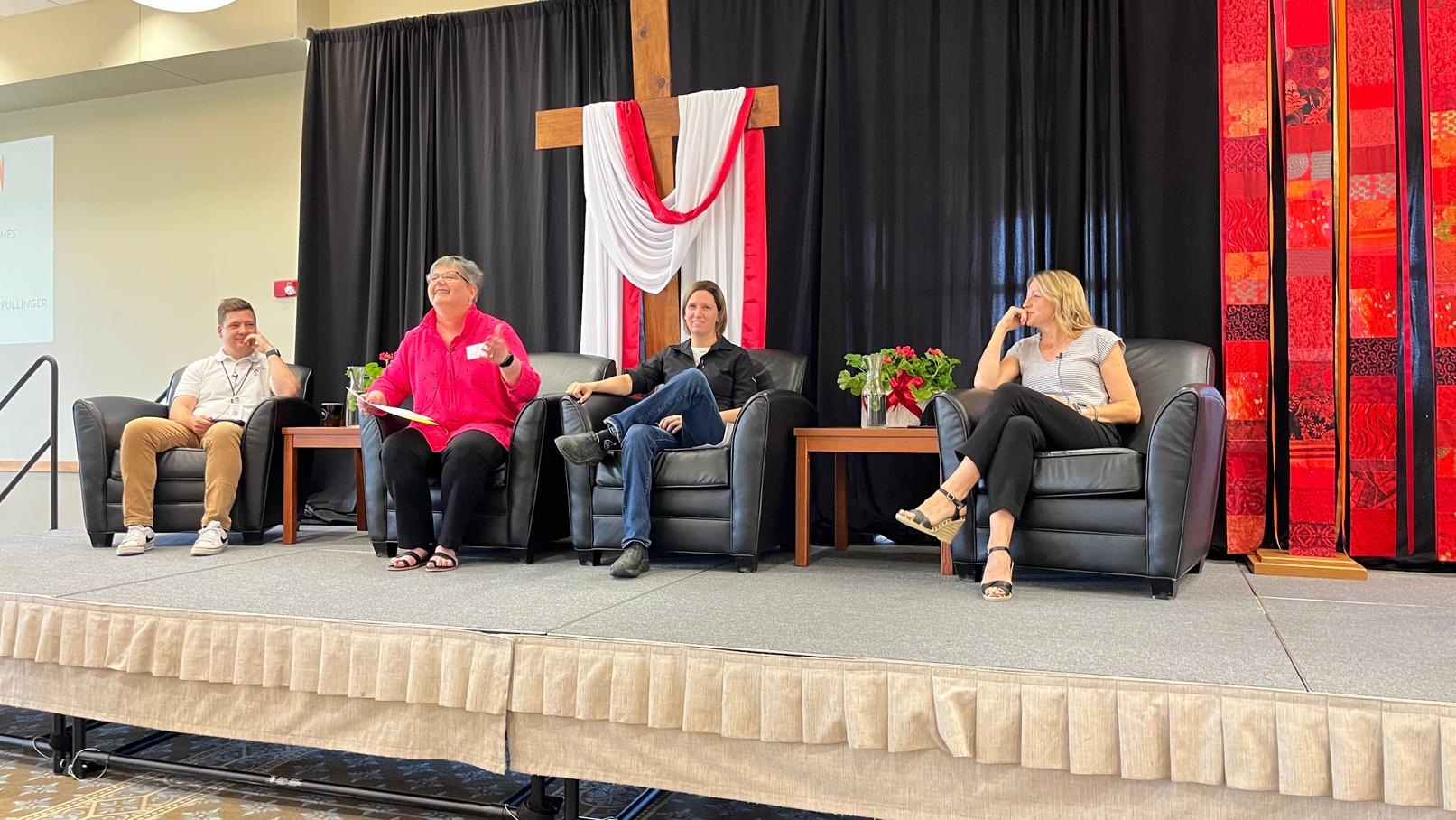
JULY
6, 2023Encouraging people to participate in the life of the Church requires more than programming and bulletin announcements, panelists said during the diocesan Synodal Summit last month. “We have to find ways to explore and adapt,” said Trevor Pullinger, diocesan director of faith formation and catechesis coordinator
Several-hundred people from parishes and schools throughout the diocese gathered in St. Ambrose University’s Rogalski Center June 17 for the event. The second of three panels focused on participation.
Tasha Havercamp, director of evangelization and mission for St. Paul the Apostle Parish in Davenport, talked about the importance of creating Christ-centric small groups where people feel comfortable and included. She encouraged the audience to consider Jesus’ example: “He took a small group and really lived life with them for three years.”
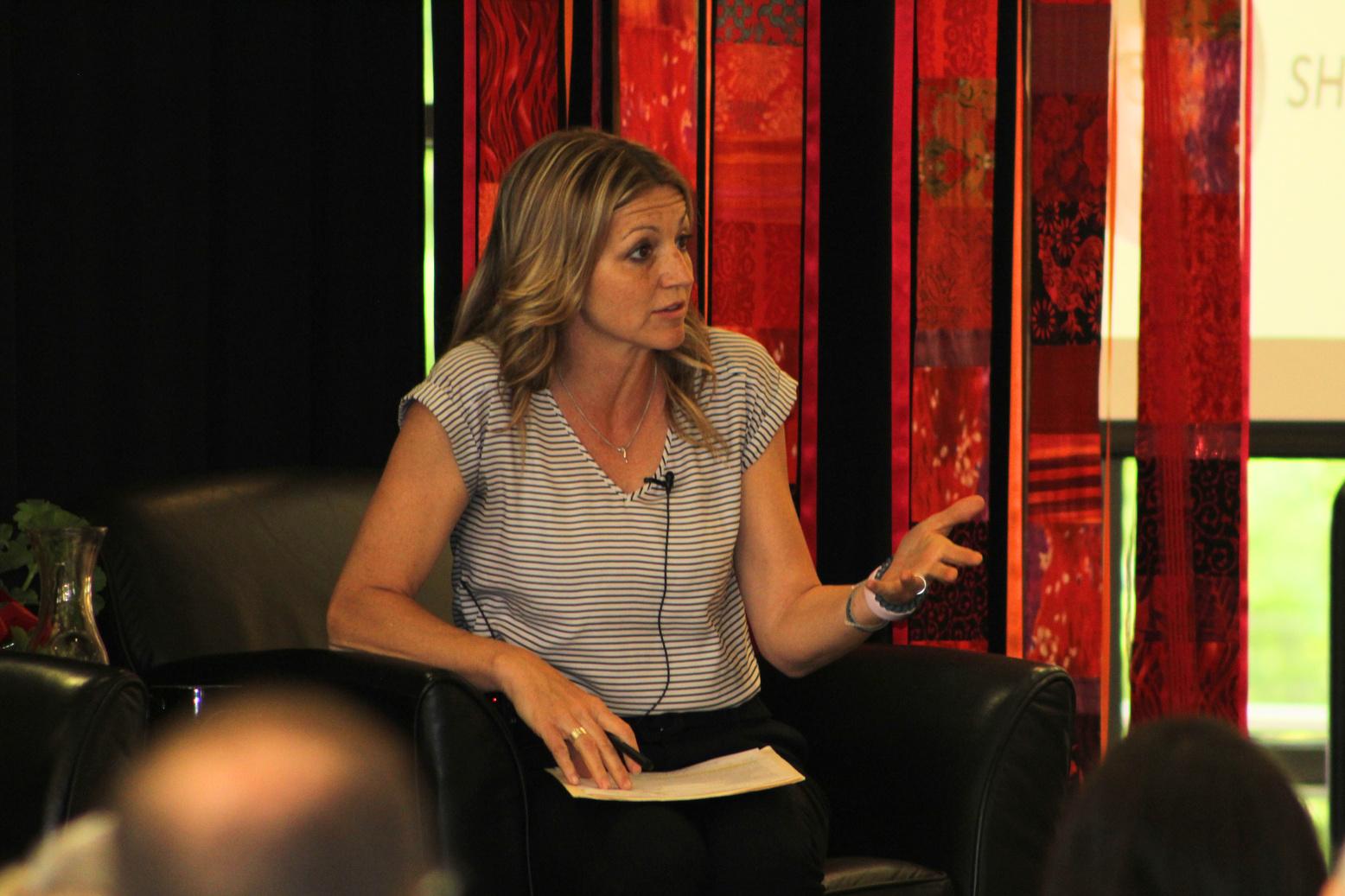
Catholics must personally reach out to people and consider their needs. “Think about that person you’re most saddened about not being engaged (in the faith community),” she said. “What do you think it would take to get that person into a small group?” It might mean meeting them for coffee, drinks or lunch and listening to their story. “What it will take is relationship,” she said.
Low-key fellowship opportunities are stepping stones to small groups and deeper parish engagement, she said. “We want to create safe spaces where people can belong and get to know each other in Christian fellowship.”
Youth minister Julia Jones of St. Ann Parish in Long Grove shared the story of her college-aged cousin, Jack and his “best
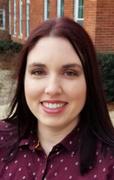
church friend,” Bob. The older gentleman noticed Jack attending Mass alone and helped him feel connected to the parish by inviting him to get involved.
parish” to empower youths in their faith journeys. “One person cannot do the job alone.” Everyone must work together to build stronger relationships with youths in the parish.
One way the Long Grove parish engages young people is by offering two spaces on the parish council. “Everyone at the table recognizes them as equals,” Jones explained. “Sometimes the conversation is over (the youths’) heads but they understand their roles and are held to a higher responsibility.”
She encouraged the summit participants to be more like her cousin’s friend, Bob. “Think about when you were growing up. Who was the Bob who made you feel connected? I invite you to become Bob and go be Bob for somebody else.”
School principal Sharon Roling spoke about
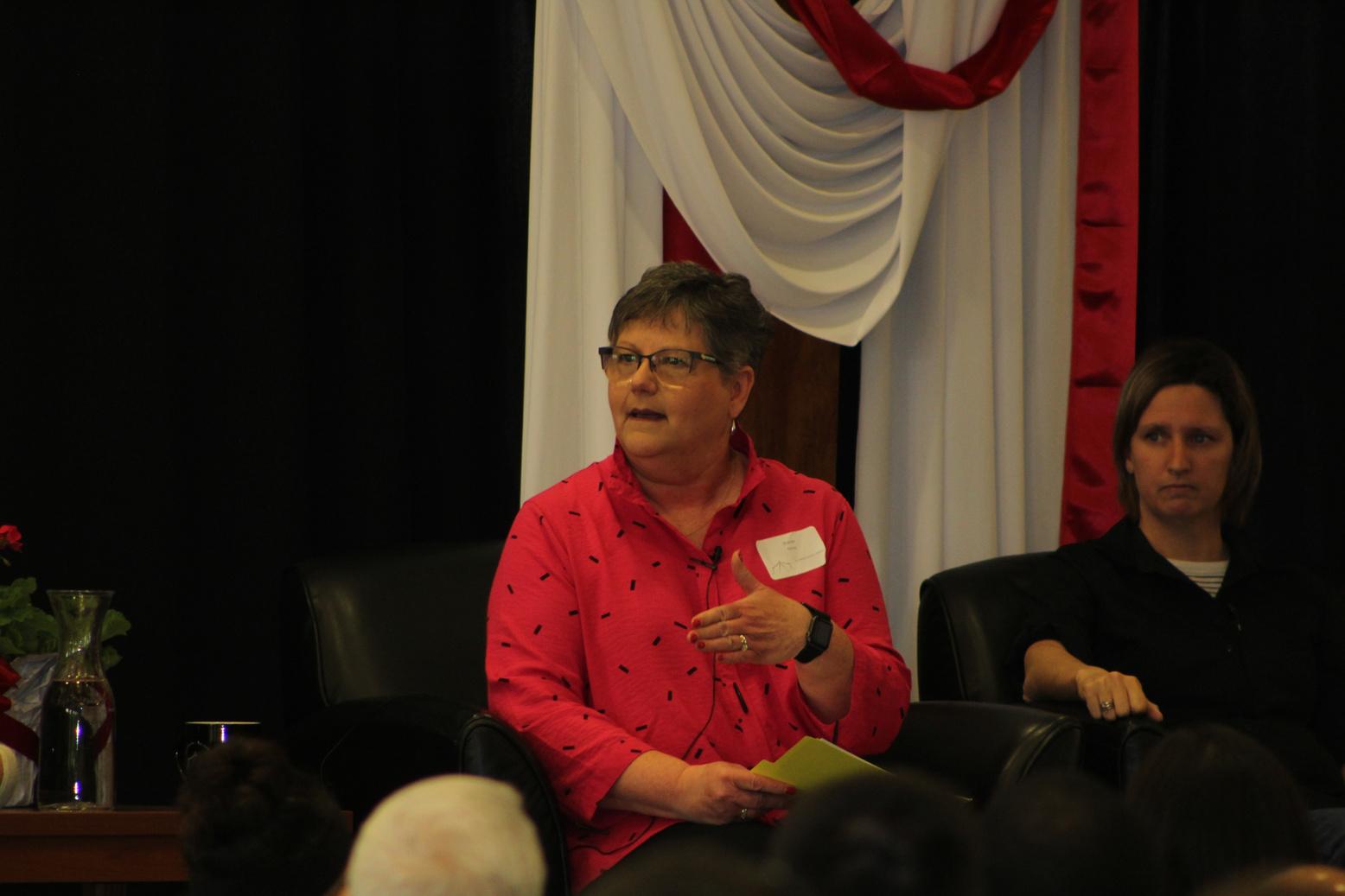
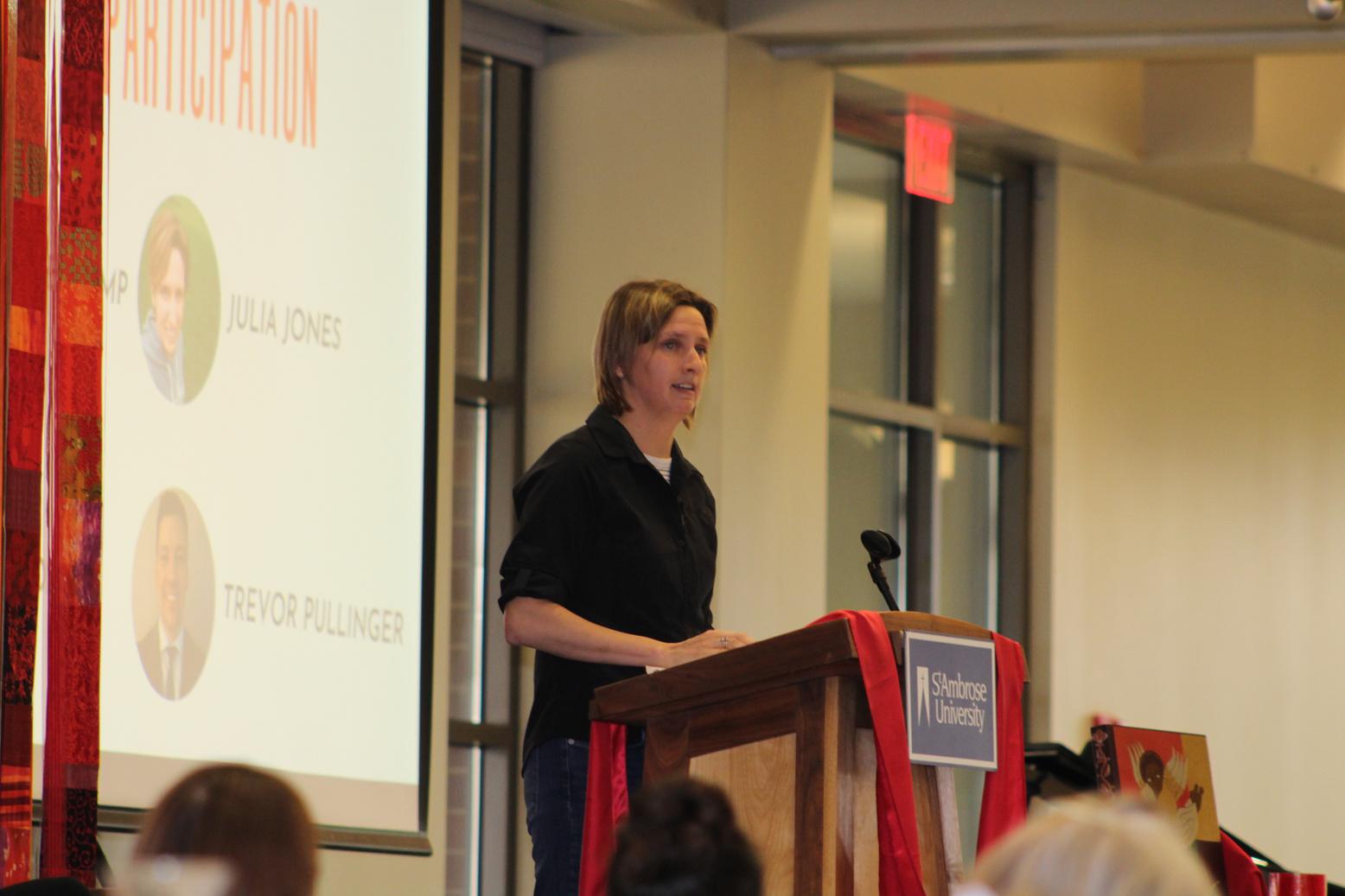
“Whether you have a youth minister or not, it is the responsibility of every adult in the
Whether you have a youth minister or not, it is the responsibility of every adult in the parish to empower youths in their faith journeys.
St Joseph Catholic School-DeWitt’s efforts to help students and parents feel welcome. Several years ago, she and the school secretary attended a workshop on student information systems and they were blown away by the “genuine, authentic, contagious” energy at the workshop. “We got out of the car and people were welcoming us. It was crazy fun!” On the way home, the women considered what it would be like to bring that energy back to the school.
Creating a culture of welcoming comes from a mixture of fun, engaging activities and intentional, everyday gestures, Roling said. Eighth-graders cheer on students on the first day of school by forming a tunnel and shaking pompons and that can be as welcoming as the lunch ladies learning students’ names and engaging them in conversation. When parents are on campus, it’s important to offer hospitality and help them connect with each other
Pullinger, a husband and father of six, discussed the importance of the domestic church. Parents play a huge role in passing on the faith and there are “a lot of ways to think about” family faith formation. But, parents need support. Recent diocesan polls show that many parents today struggle to share the faith with each other, much less their own children, he said. “They feel unqualified or not sure what to share or they’re afraid they’ll mess up.”
families and the challenges they face, including overscheduling, overcommitment, loneliness and exhaustion. “Finding a way to be an oasis for them” is crucial. “We want to be that place where the family can find rest,” as well as a sense of warmth and belonging. “To think creatively is to meet families where they hurt most and provide spaces where they can thrive.” Offering a free meal is one way to do this because it means the parents don’t have to cook and they can focus on being together
After the panelists spoke, summit participant Jim Tiedje of Sacred Heart Cathedral in Davenport said he believes there is a “tremendous opportunity to bring people back” to the faith and help the next generation of Catholics. “I think we, as ‘Old Bobs,’ can start thinking differently about who these kids are and what they can accomplish.”
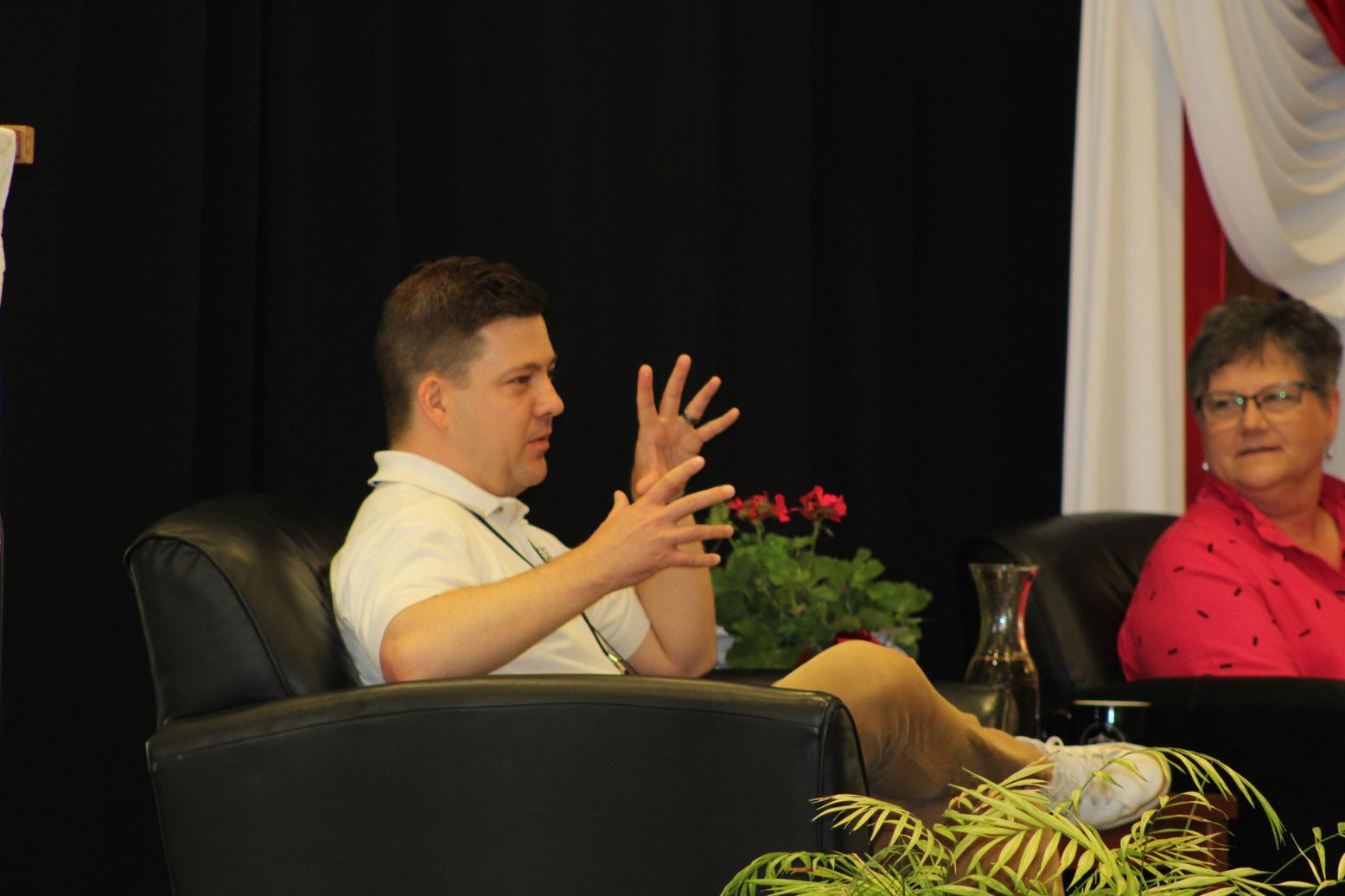
"Participation is based on the fact that all the faithful are qualified and are called to serve one another through the gifts they have each received from the Holy Spirit. In a synodal Church the whole community, in the free and rich diversity of its members, is called together to pray, listen, analyse, dialogue, discern and offer advice on making pastoral decisions which correspond as closely as possible to God’s will " (From the Vademecum for the Synod on Synodality)
Are there opportunities in my community for people to experience small group that are 1) safe for people to be themselves, 2) clearly centered on Christ, and 3) spaces to building good friendship? In our approach to activities are we more strategic and systematizing, or is our approach more incarnational, where we are responding to the specific needs of the people in our community? Who can I be an "Old Bob" for? Who can I invite to help, contribute, and get involved in a deeper way? We need to focus on teens as people with specific needs and desires. There is no "one-size-fits all" for teens. How can I be responsive to their desires? Have I listened to them with curiosity and humility first? How is my household faith lived out? How can I promote a household faith within my wider social circles? How can we be an oasis for families in the desert of overscheduling, overcommitment, overstimulation, lonleness, and exhaustion? Can we solve of problem for families (e.g. giving them a meal)?
Consider inviting people new to the community for a coffee conversation to help them feel welcome. Ensure that offerings involve a spectrum of commitment levels, including both low threshold opportunities that are easier for people to say "yes" to as well as deeper commitments
It may be valuable to promote this awareness: while the community may employ a youth minister, youth ministry is everyone's job. If this would be valuable, consider ways to promote awareness. Consider providing food for youth group nights or help coordinate a calendar for various groups to provide food (Warning: if you send mozzarella sticks you will become a "local celebrity").
It may be valuable to empower youth through membership on parish commissions and councils. Help older children understand how to better welcome young children in the community
Seek out those who are alone at a large group gathering Consider introducing them to others
Take concrete steps to identify and address the challenges families in your community face. Pivot from ministering to specific youth to ministering to households of faith.



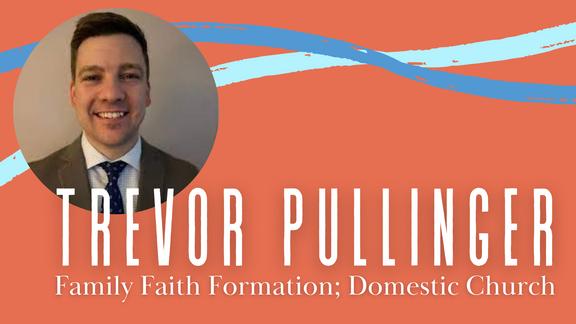

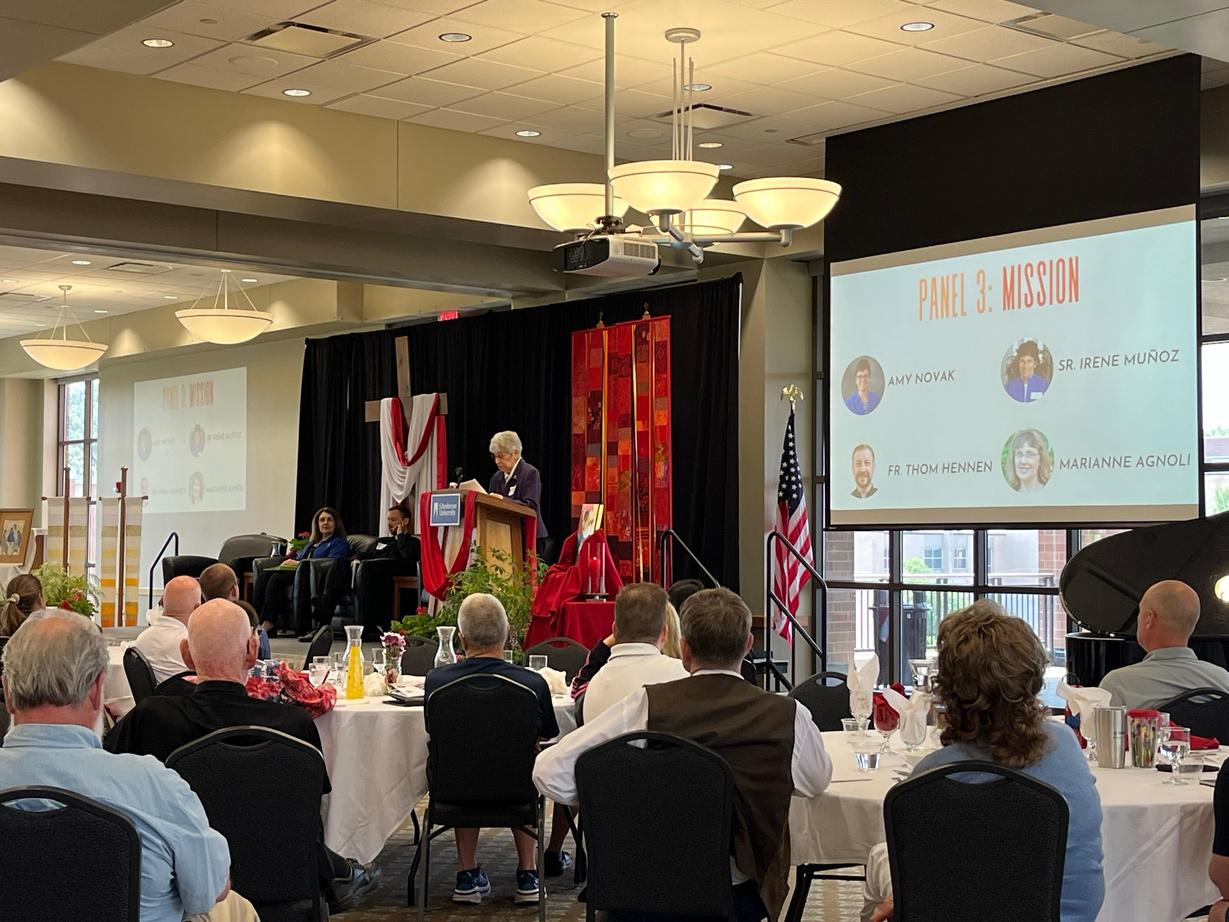
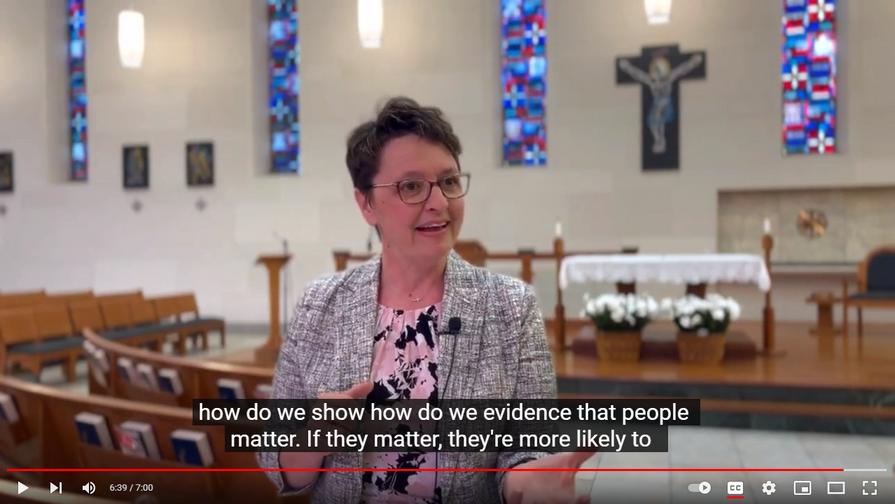
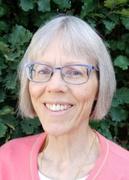 BY BARB ARLAND-FYE
JULY 13, 2023
BY BARB ARLAND-FYE
JULY 13, 2023
Two years ago, Pope Francis asked Catholics worldwide to engage in listening sessions focusing on three dimensions of a Synodal Church communion, participation and mission to share with the Synod of Bishops that will convene in October.
“These three dimensions are profoundly interrelated. They are vital pillars of a Synodal Church,” Pope Francis said.
“Mission,” the third dimension, “is intended
to enable the Church to better witness to the Gospel, especially with those who live on the spiritual, social, economic, political, geographical, and existential peripheries of the world,” Pope Francis said. “In this way, synodality is a path by which the Church can more fruitfully fulfil her mission of evangelization in the world, as a leaven at the service of the coming of God’s kingdom ”
Young adults find community in “good church” and a space for reflection in an often chaotic world, St. Ambrose University President Amy Novak said in a video message during the Synodal Summit’s third panel, focused on mission. She spoke of the profound experience of listening to young people in synodal listening sessions. Some expressed hurt, “particularly around parents who’ve divorced and now are not going to church at all, around a family member or friend who’s part of the LGBTQ community and didn’t feel welcomed.” There’s concern about polarization, about bishops arguing with bishops or priests delivering conflicting messages.
Watching student groups develop organically over the past year, she has learned that “it’s not about what I think they need, it’s about what they create and how we give space to them to be co creative
really living into the joy of what it means to be Church. They’re invested in inclusion and prayer and just being alongside one another, and mercy.”
Sister Irene Munoz, CHM, spoke on cultivating unity in multicultural settings and the need to enlarge the tent (a symbol of the Synod) religiously and culturally. She retired last year as multicultural minister for the Ottumwa area. “ … As a Hispanic woman, religious and activist, I have been blessed to have had the opportunity to minister to, to walk with, to struggle with and to celebrate with immigrants,” she said. She named the various languages now spoken in Ottumwa by immigrants from South America, Central America, Micronesia, the Philippines and countries in Africa.
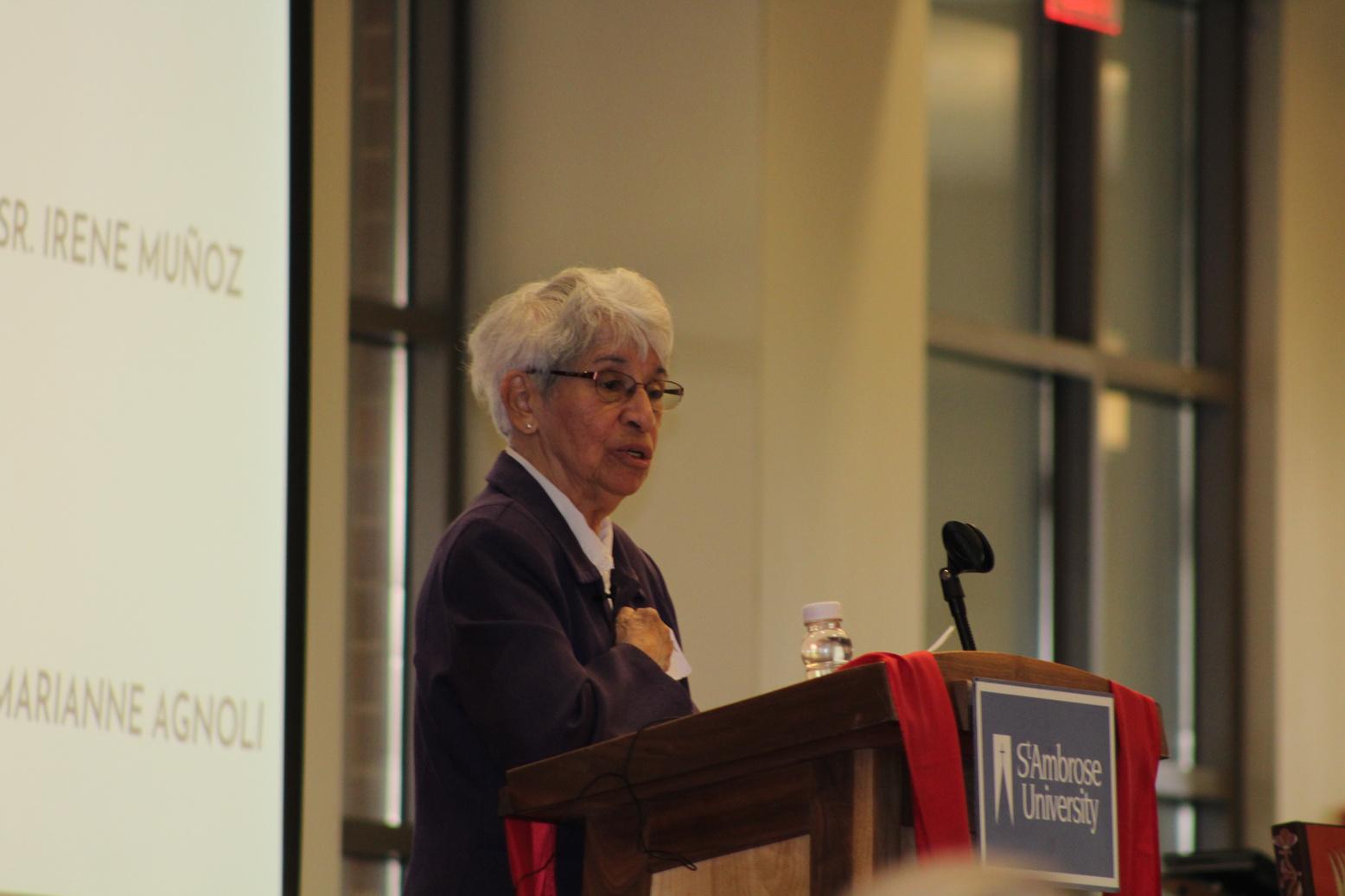
Sister Munoz advised the gathering to be aid to welcome the newcomers and to to their stories. They arrive in the U.S. ape violence, poverty and upheaval in homelands. Ask “for the Holy Spirit to s, to endear us, to have those gifts of irit of compassion, of listening,” she earn some simple words of welcome t person’s native language. etimes our body language speaks r than words,” she cautioned.
r Thom Hennen, diocesan vicar al and pastor of Sacred Heart dral in Davenport, spoke about RAGE, an apostolate helping same-sex
attracted Catholic men and women to chaste lives. Through this work, he als became involved in ministry to family members and other loved ones of peo who are part of the LGBTQ+ commun Now, he is part of a diocesan committ exploring “how we can better encoun them, accompany them on that journ He shared lessons he’s learned in this ministry. “Remember, people are peo
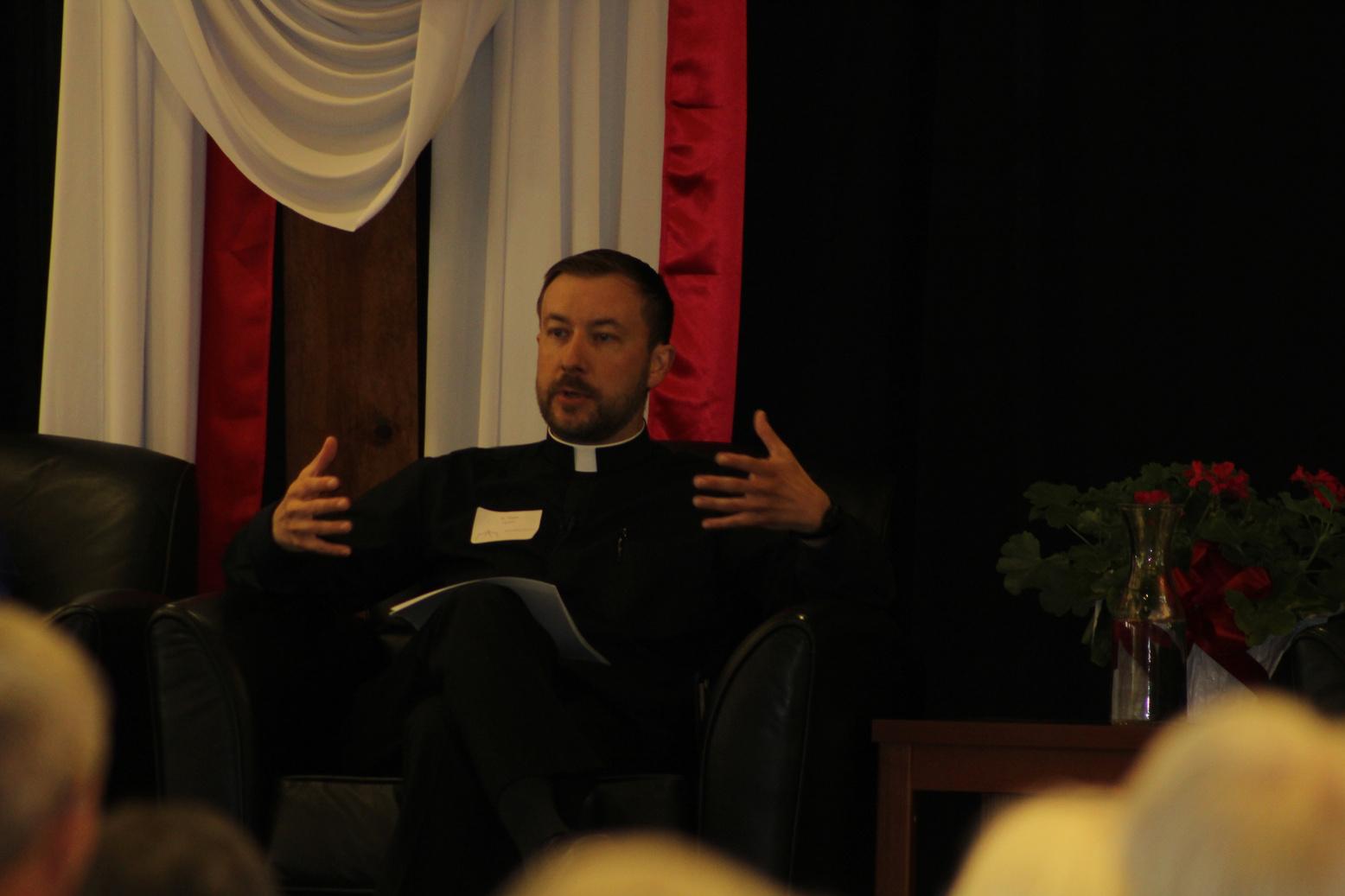
He met LGBTQ+ people “who are and want to be Catholic and who love the Church and who love their Catholic faith.” These are people faithfully living their Catholic faith despite their possibly negative experiences within the Church. They are “wrestling with who they are in relationship to the Church they love,” he said.
“It is important to listen for understanding and not to judge,” Father Hennen said. “We should not feel forced into choosing
what we have to navigate very carefully.”
Marianne Agnoli, diocesan marriage and family life coordinator, spoke about ministry to divorced persons, remarried couples and to couples in ecumenical or interfaith marriages. She advised ministers and pastoral leaders to get educated on these topics and to educate their communities. “There is so much misinformation about what the Church teaches and what the Church allows or he said Think of various he accurate information,
development of divorce and promotion of the al’s presentations on the ess. She recommended al about programs and urture welcoming and onally invite a spouse who is erve in a role in the parish,
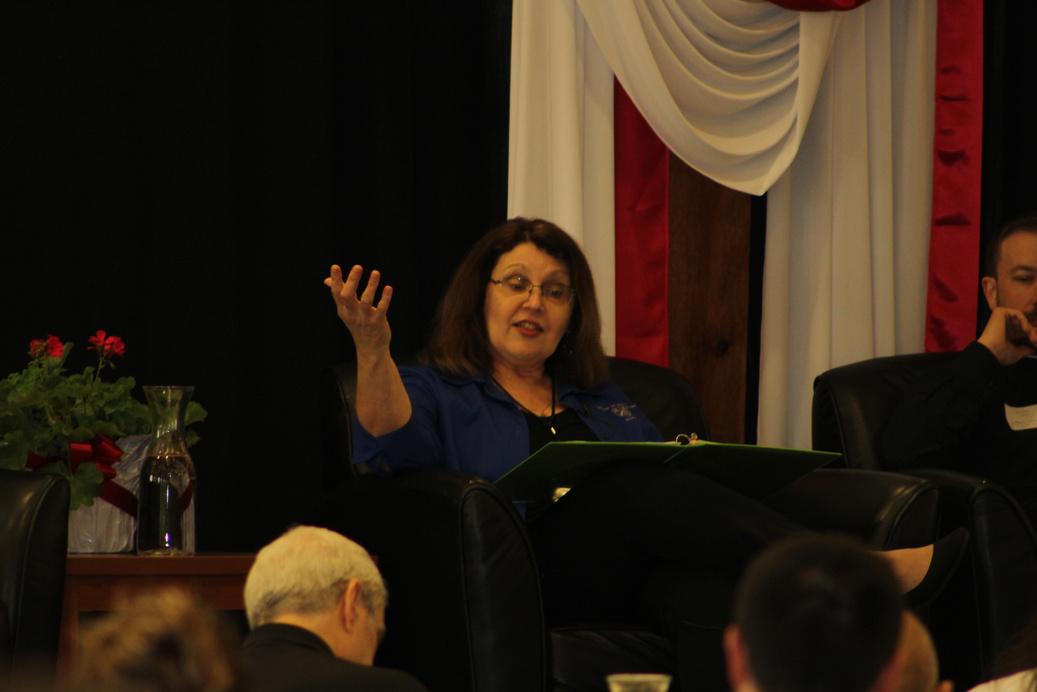
"The Church exists to evangelize. We can never be centred on ourselves. Our mission is to witness to the love of God in the midst of the whole human family. This Synodal Process has a deeply missionary dimension to it. It is intended to enable the Church to better witness to the Gospel, especially with those who live on the spiritual, social, economic, political, geographical, and existential peripheries of our world " (From the Vademecum for the Synod on Synodality)
Do we create "on-ramps" for the participation of young people on the fringes of the community?
Young people are often less judgmental than other generations They also often view the Church as judgmental. How do we nurture non-judgmentalism in our community?
Young people don't confine Church to the building. How can we make the Church present in spaces out in the wider community beyond the four walls of our parish and/or school?
Have I recently listened to someone whose story might be very different than my own? Who can I visit with to hear their story? What kind of setting might provide the best space for this?
There are very likely LGBTQ+ Catholics in your pews and schools right now What actions can you and the community take to ensure those persons, their families, and their friends feel welcome?
Young people have a desire to contribute, so instead of asking, "what can we give to people who come through our door?", ask "what spaces can we create to allow people to contribute their gifts?"
Create spaces for intentional silence, even during large group gatherings.
Pray that the Holy Spirit awaken in us a compassionate heart for those on the margins.
Cultivate devotion to Our Lady of Guadalupe, patroness of the Americas, in your community. Help newcomers, especially minorities, claim belonging for themselves in their new community.
If someone you know might benefit from the Courage ministry, reach out to folks at the Chancery
Promote awareness of facts and myths on the topic of LGBTQ+
Start a support group for LGBTQ+ persons and families. Include them in the prayers of the faithful.
Promote awareness of facts and myths on the topic of divorce and the divorced and civilly remarried. Start a support group for divorced people and include the divorced in the prayers of the faithful. Support those in interfaith marriages by starting a support group or inviting the non-Catholic spouse to participate in the community in a meaningful way
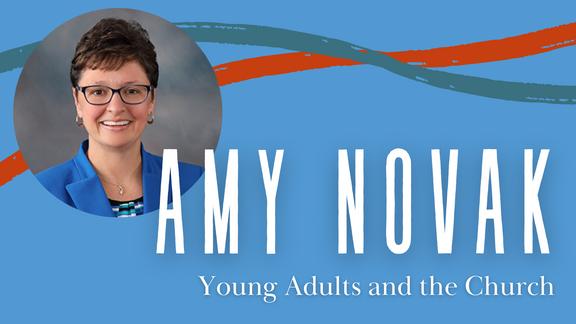
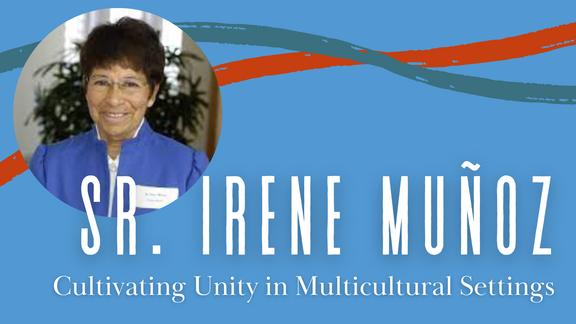
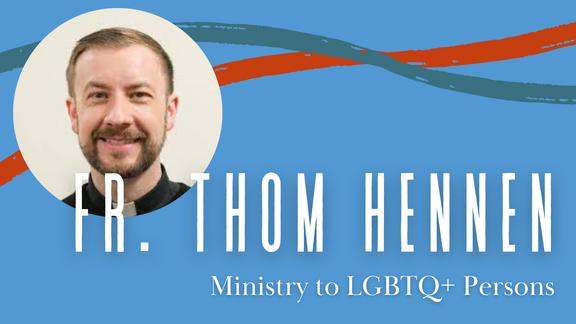
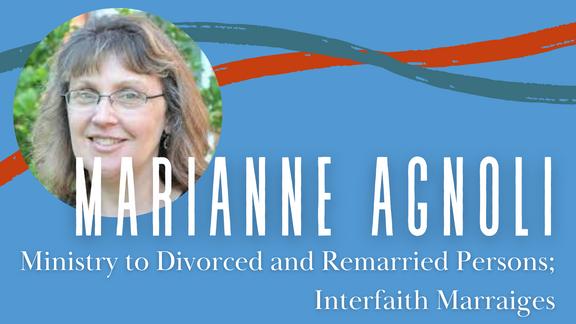

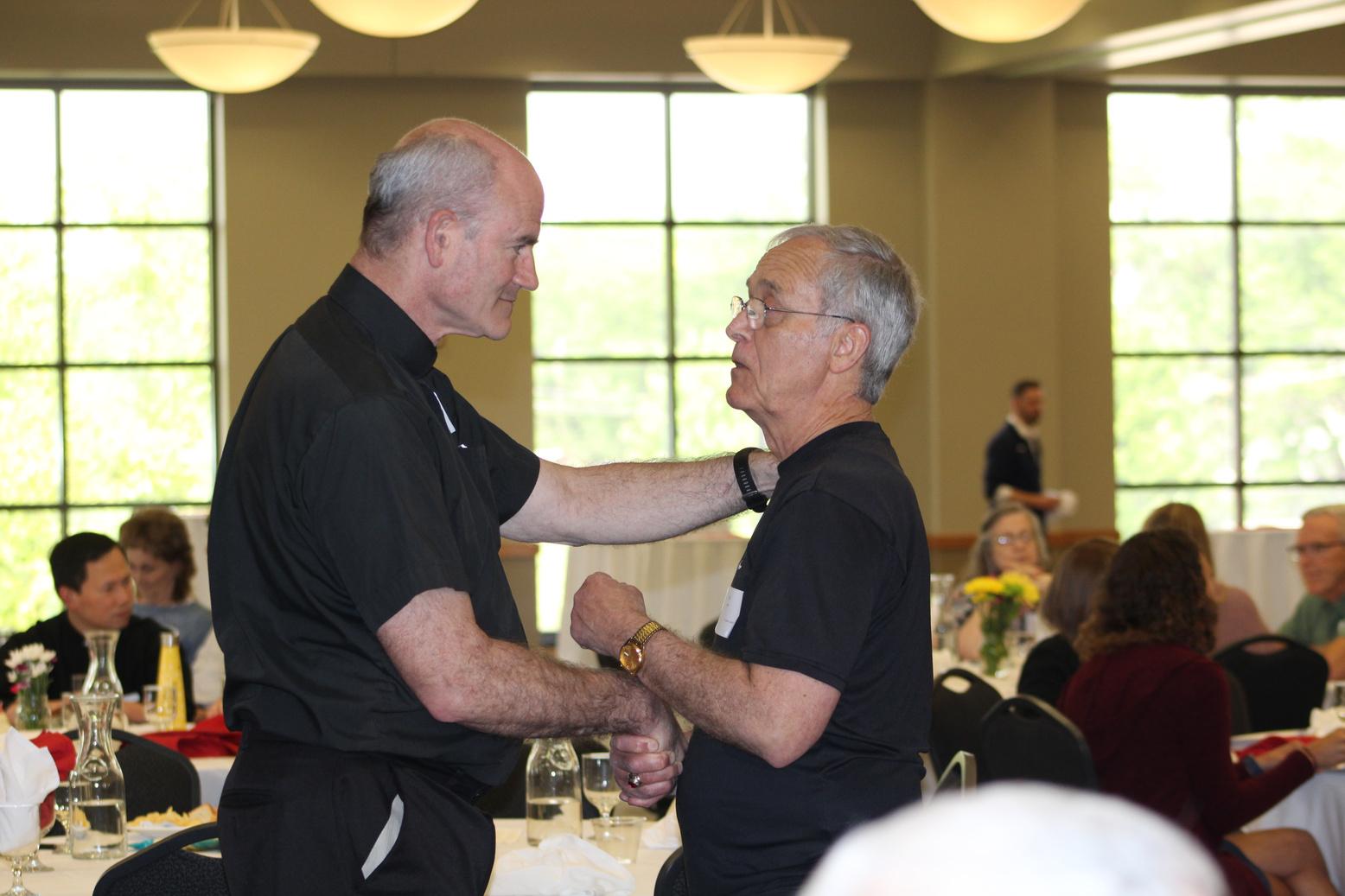
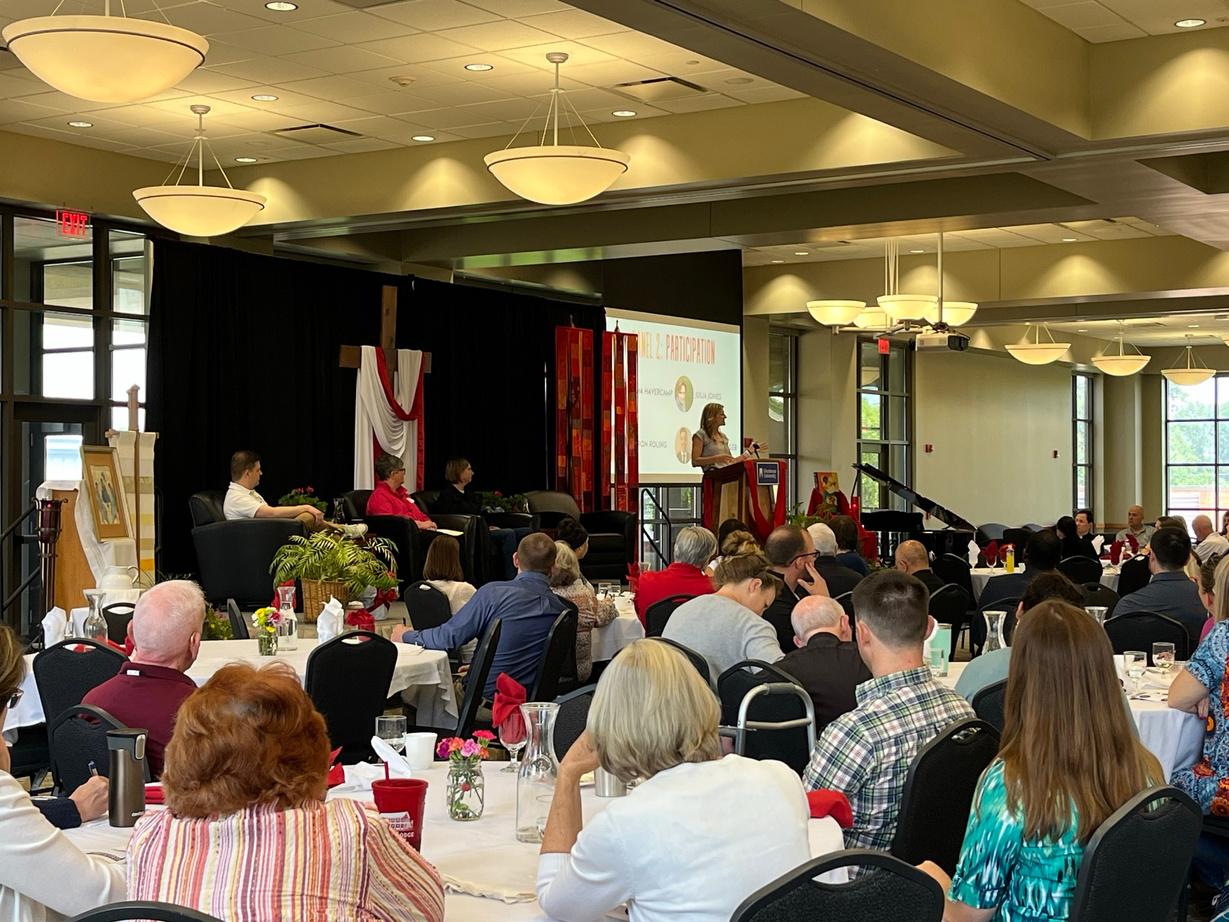
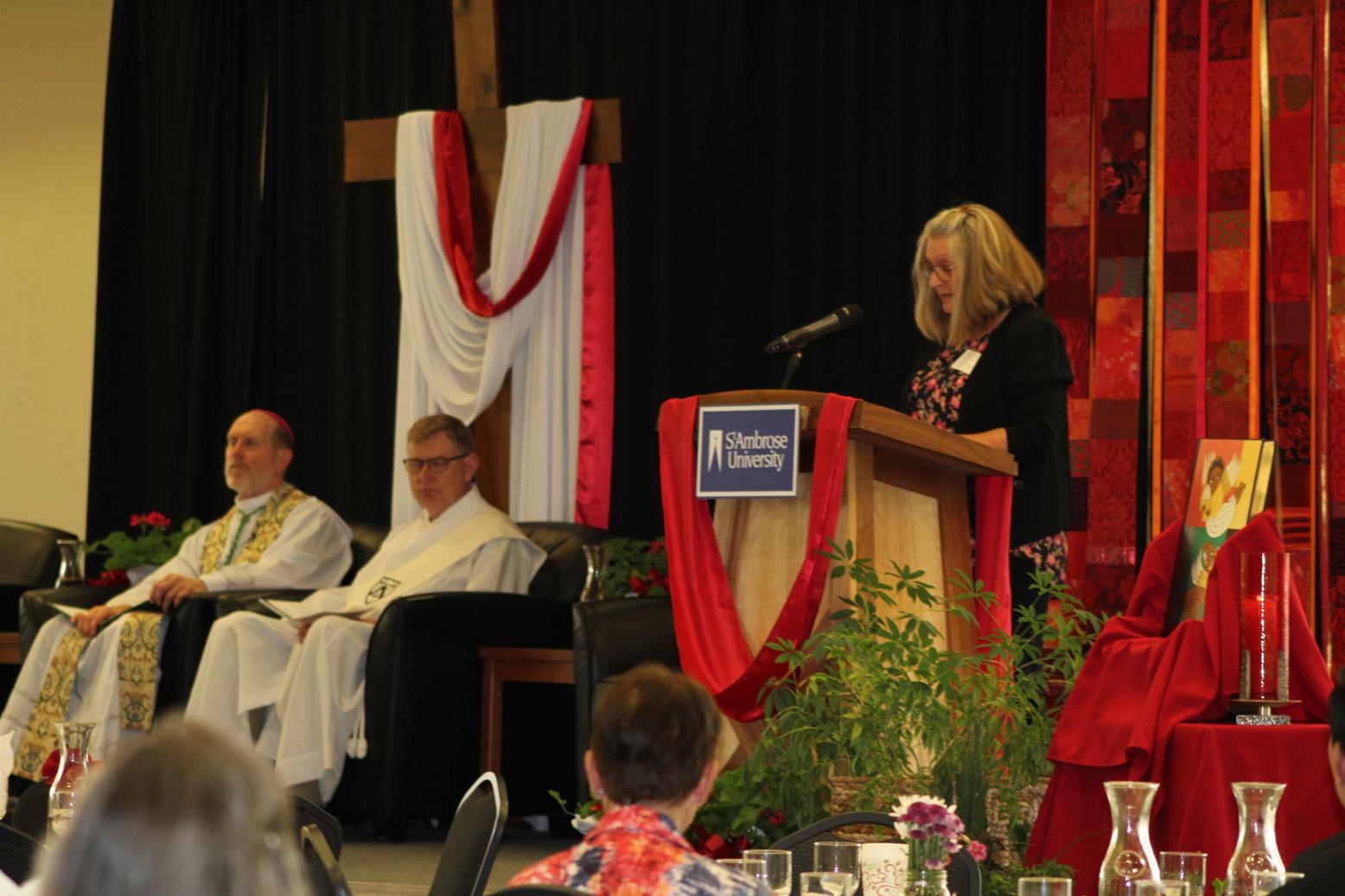
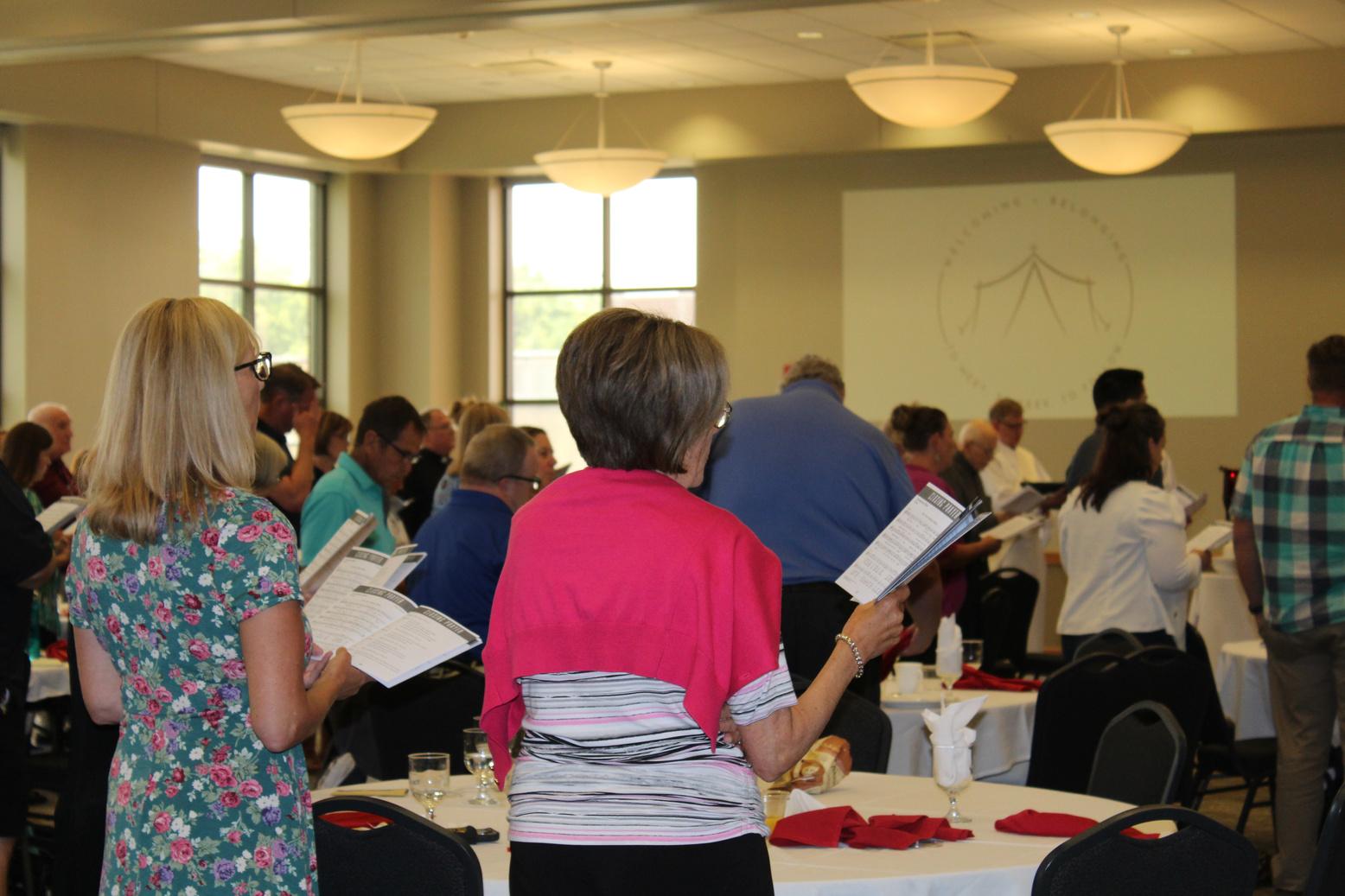
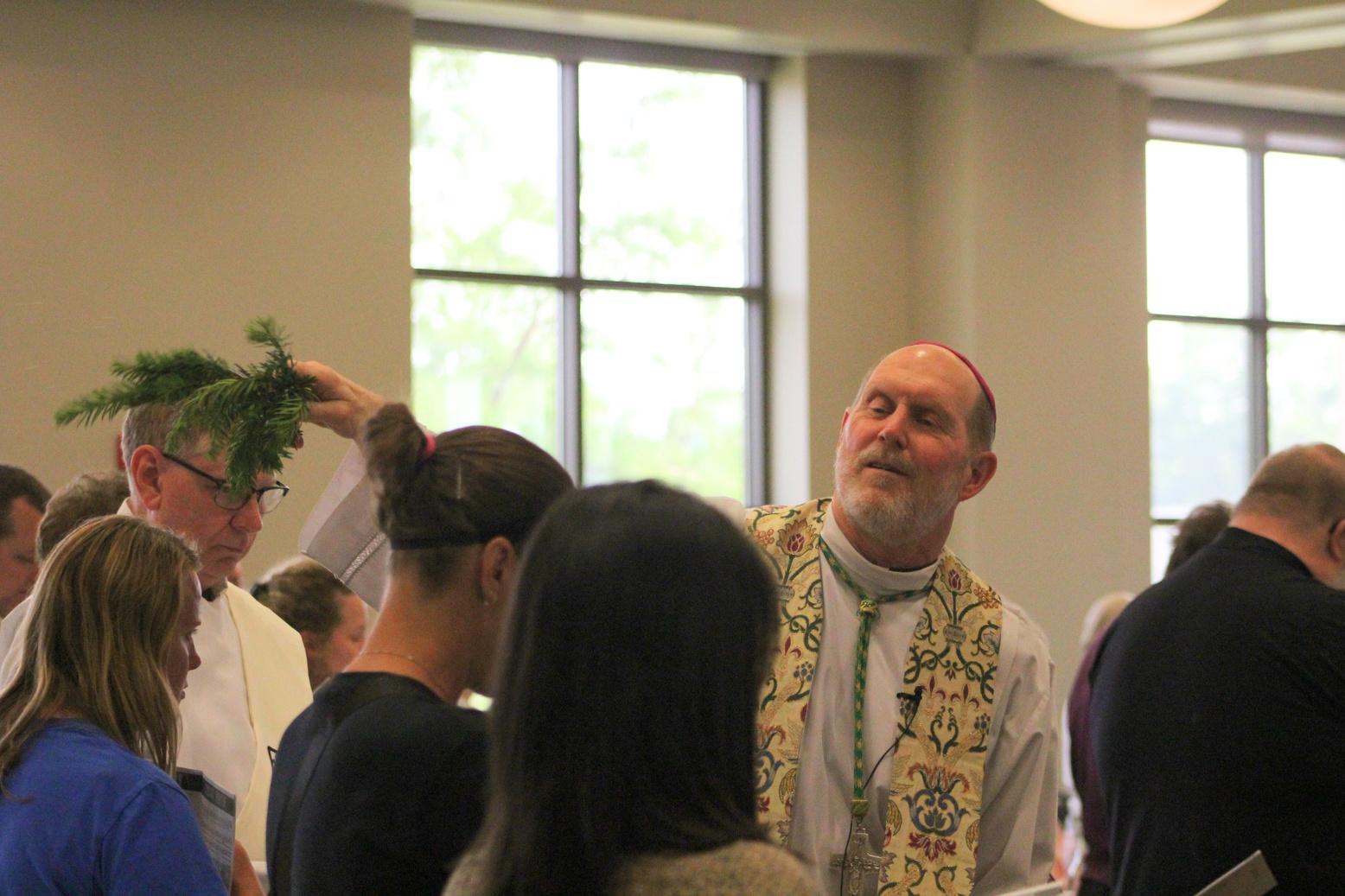
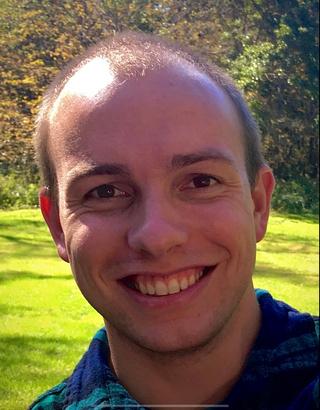 BY PATRICK SCHMADEKE MARCH 2, 2023
BY PATRICK SCHMADEKE MARCH 2, 2023
As Bishop Thomas Zinkula indicated in his Epiphany letter, sent to some 28,000 households across the Davenport Diocese, we have a roadmap: “In June 2023 we will kick off a diocese-wide focus on three themes, one per year, over the next three years Year one will focus on welcoming and belonging; year two will focus on youth and family engagement; and year three will focus on Church teaching and tradition.”
The order in which we are addressing these themes has an inner logic. Springtide Research Institute, which researches the overlap between the religious experience and human experience of 13- to 25-year-olds, makes this succinct observation: “one of the fundamental truths about communities that sociologists have long known is that belonging comes before believing … however, we often get that equation backwards … we think that we must get everyone convicted of the same set of principles first, and then the community will emerge. This approach is not only ineffective but often leads young people to distrust organizations and disengage from them.”
Our diocese’s progression from year 1 to year 3 themes demonstrates this inner logic. People progress from belonging to believing. Not the other way around. A sense of belonging functions as the soil from which belief emerges. Take away the soil and belief has no foundation in which to take root.
I had an experience in my own life when I had this progression backwards. Sometime in my late teens or early 20s, I became aware of the fact that there are more than 30,000
"A sense of belonging functions as the soil from which belief emerges. Take away the soil and belief has no foundation in which to take root."
Christian denominations in the United States. I pondered the next logical question: since I was born into one of these 30,000 denominations, from a purely statistical perspective, what are the odds that I was born into the “correct” one?
The next logical step (to me at that time) was to create an Excel spreadsheet with the central beliefs of broad denominational categories. I quickly realized how big my spreadsheet would need to be, so I raided the library. I found books that compared and contrasted beliefs in a matter-of-fact sort of way. They included the most prominent figures from each denomination and major historical events in the evolution of the faith community. But this was all just information.
Ultimately, charts, data, facts and figures are not compelling on their own. Human communities are compelling And if we do find a chart compelling, it is because of its co-relation to a living, breathing community. Charts can be useful along the way (I love Excel!), but information alone doesn’t decide anything. Meaning is found enfleshed in the living faith of a community.
In our diocese, we continue to discover the many ways in which some do not feel at home in the Church. They feel as though they do not belong This is tragic and their leaving is our loss. Without them, we are less than what we otherwise might be.
fresh awareness may emerge about how those who feel excluded concretely experience that exclusion. With that awareness in hand (or better yet, in our hearts), we can take action steps. The role of the diocese is to provide support, guidance and resources along the way. There is no one-size-fits-all solution to any of this.
The Holy Spirit is on the move. God is not asleep at the wheel All that remains is our readiness to respond and follow, to dream and discern, and to encounter those who feel excluded and bring the healing of Christ into their lives. We’ll know we’ve done well when we discover healing in our own lives in the process. Healing is not unidirectional but it is mutual. God’s mercy has a context: in relationships, in community, in kinship, in the belonging that precedes believing.
As we focus on welcoming and belonging, a
"The Holy Spirit is on the move. God is not asleep at the wheel.
All that remains is our readiness to respond and follow...

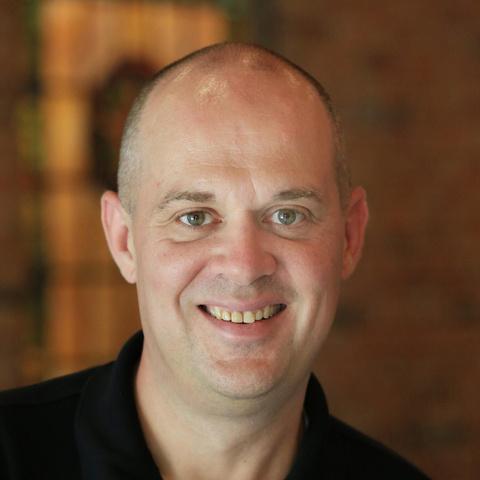
"To the people in exile the prophet’s [Isaiah] words evokes the experience of the exodus, when they dwelt in tents, and announces the promise of the return to the land, a sign of joy and hope. To prepare, it is necessary to enlarge the tent, acting on the three elements of its structure. The first is the tent cloth, which protect from the sun, wind and rain, delineating a space of life and conviviality. They need to be spread out, so that they can also protect those who are still outside this space, but who feel called to enter it. The ropes that hold the cloths together are the second structural element of the tent. They must balance the tension needed to keep the tent from drooping with the softness that cushions movement caused by the wind. That is why if the tent expands, the ropes must be stretched to maintain the right tension. Finally, the pegs are the third element: they anchor the structure to the ground and ensure its solidity, but remain capable of moving when the tent must be pitched elsewhere."
Excerpt from "Enlarge the Space of your Tent, " the Working Document for the Continental Stage of the Synod.
Pilgrim God, God of the journey…
As You walked with us in the garden of your creation And led your people from slavery to freedom, You travel the way with us still, faithful and true.
Bridge-building God, Communion of Love…
You mend wounds and overcome divisions, You erase borders and boundaries, You gather what is scattered and make us one.
Grant us the grace to be as welcoming as Sarah and Abraham, as Mary and Martha and Lazarus; to see in our diversity and differences the wonderous richness of your gifts, the outpouring of your Spirit; to have hearts open to surprise, and ears open to hearing the stories around us, stories of joy and hope, of grief and anxiety.
For to welcome any as guest is to welcome your Christ.
Of the many parts, from Melcher to Muscatine; from Colfax to Keokuk; from Centerville to Sugar Creek make us one Body, one spirit in Christ. In whose most Holy Name we pray. Amen.
You may have questions that arise as this year unfolds. Know that we are here for you. There's a team of friendly faces at the chancery who are happy to help brainstorm, share ideas, and discuss the realities you are facing. Don't hesitate to reach out.
Primary contacts for the year:
schmadeke@davenportdiocese.org

563-888-4394
Contacts for various areas of ministry:
SARAH ADAMS
Social media and web d adams@davenportdioc
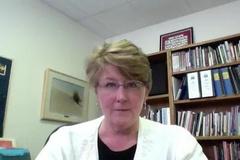
CN. FRANK A urgical hospitality
noli@davenportdiocese or
burchettr@diodav.org
MARIANNE AGNO
Marriage and family ministri
agnolim@davenportdiocese
NNE DEVANEY
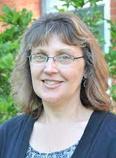
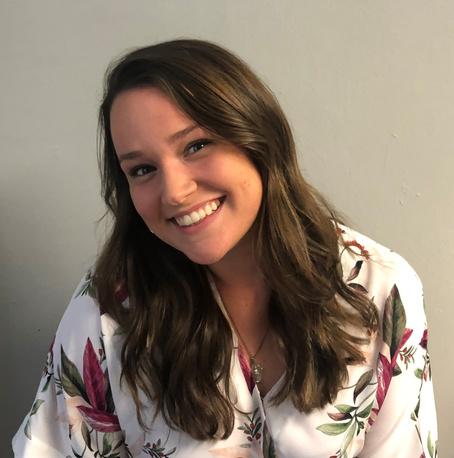
olic schools
ney@davenportdiocese org
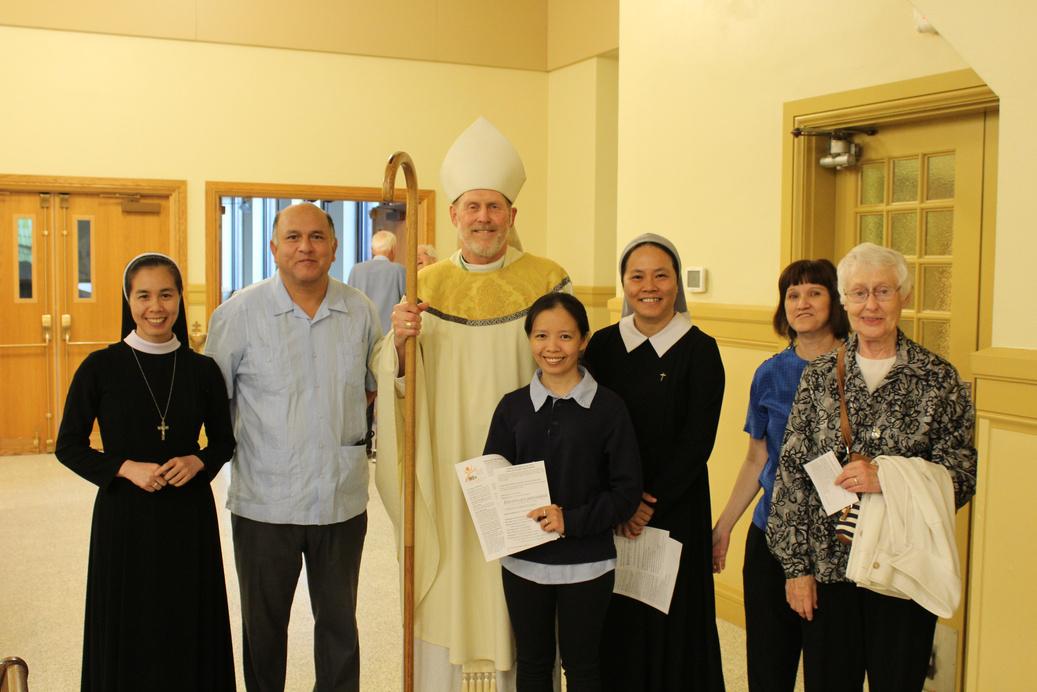
JEFF SCHUETZLE inistry


davenportdiocese org
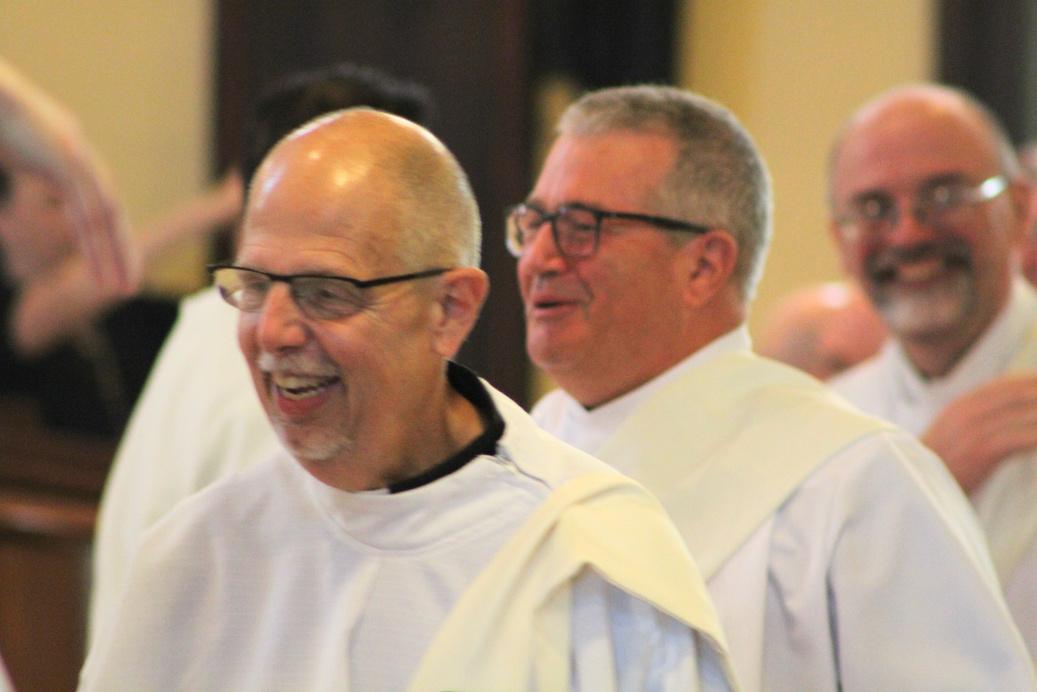
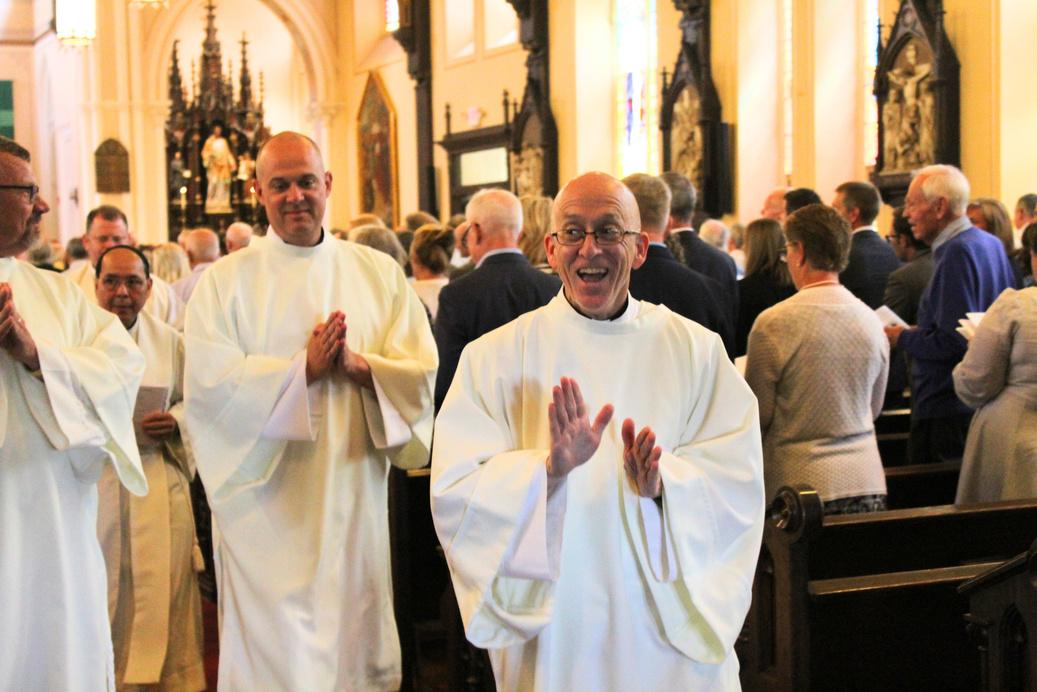 ENT FERRIS
PATRICK SCHMADEKE
DCN. RYAN BURCHETT
ENT FERRIS
PATRICK SCHMADEKE
DCN. RYAN BURCHETT

